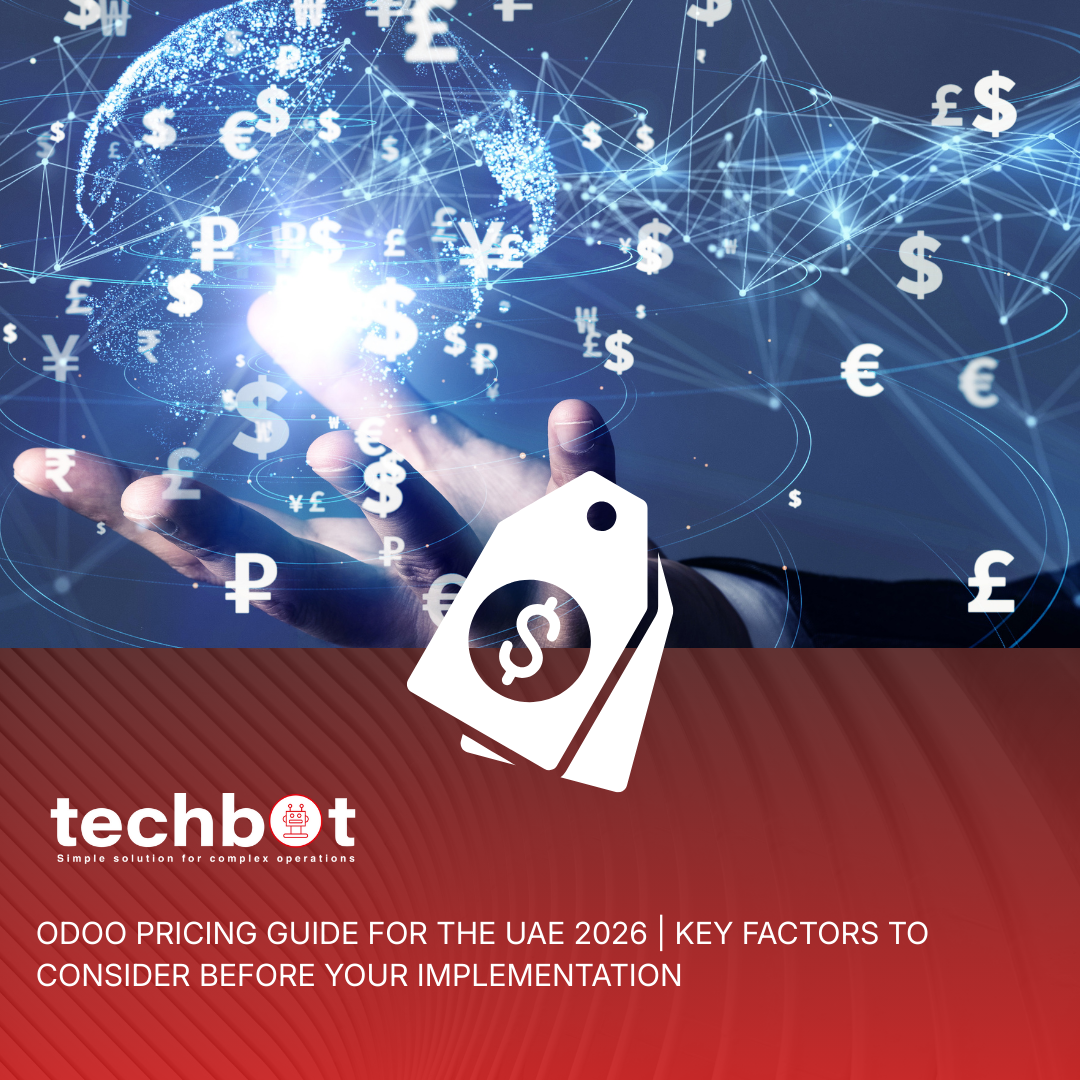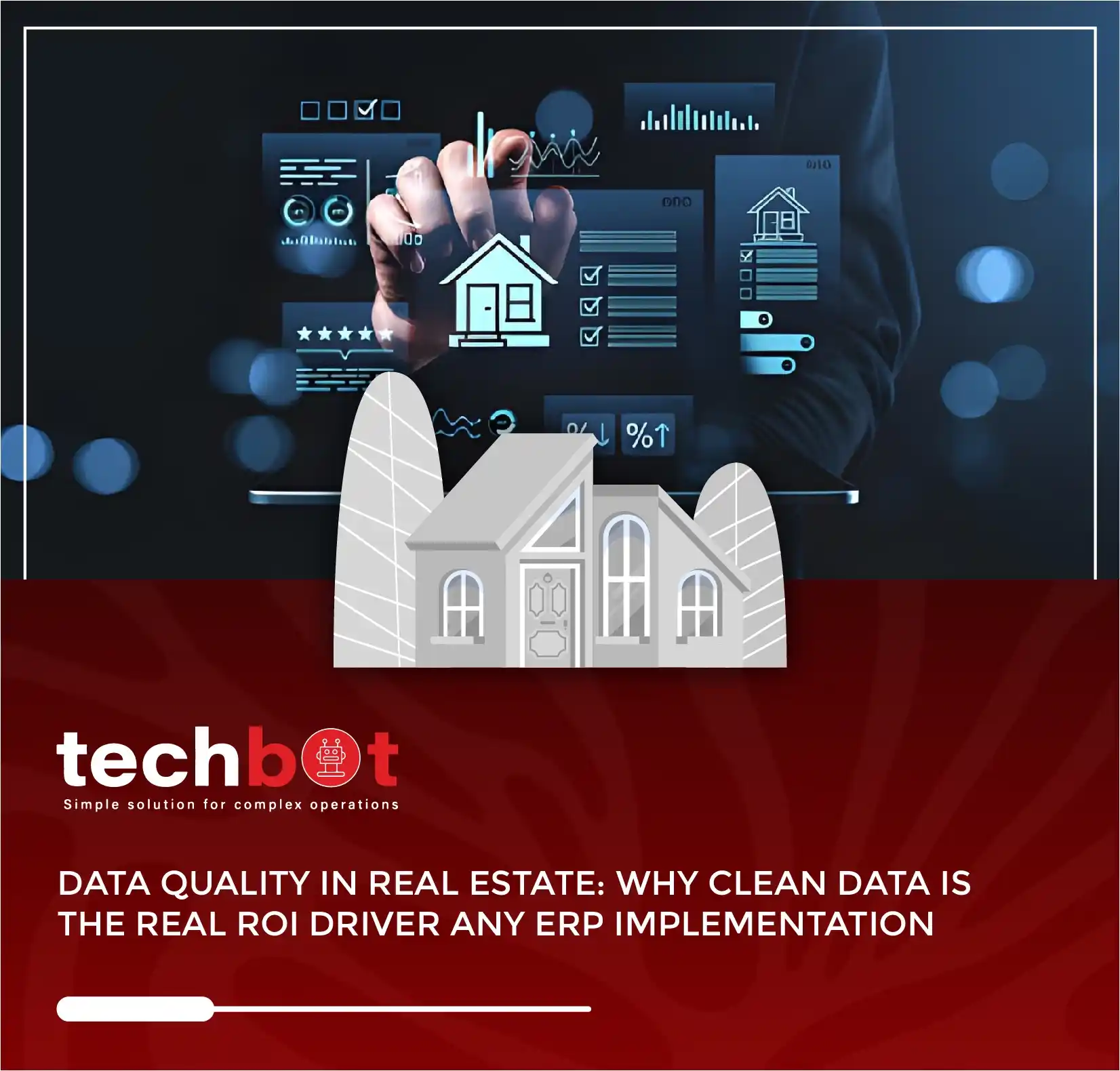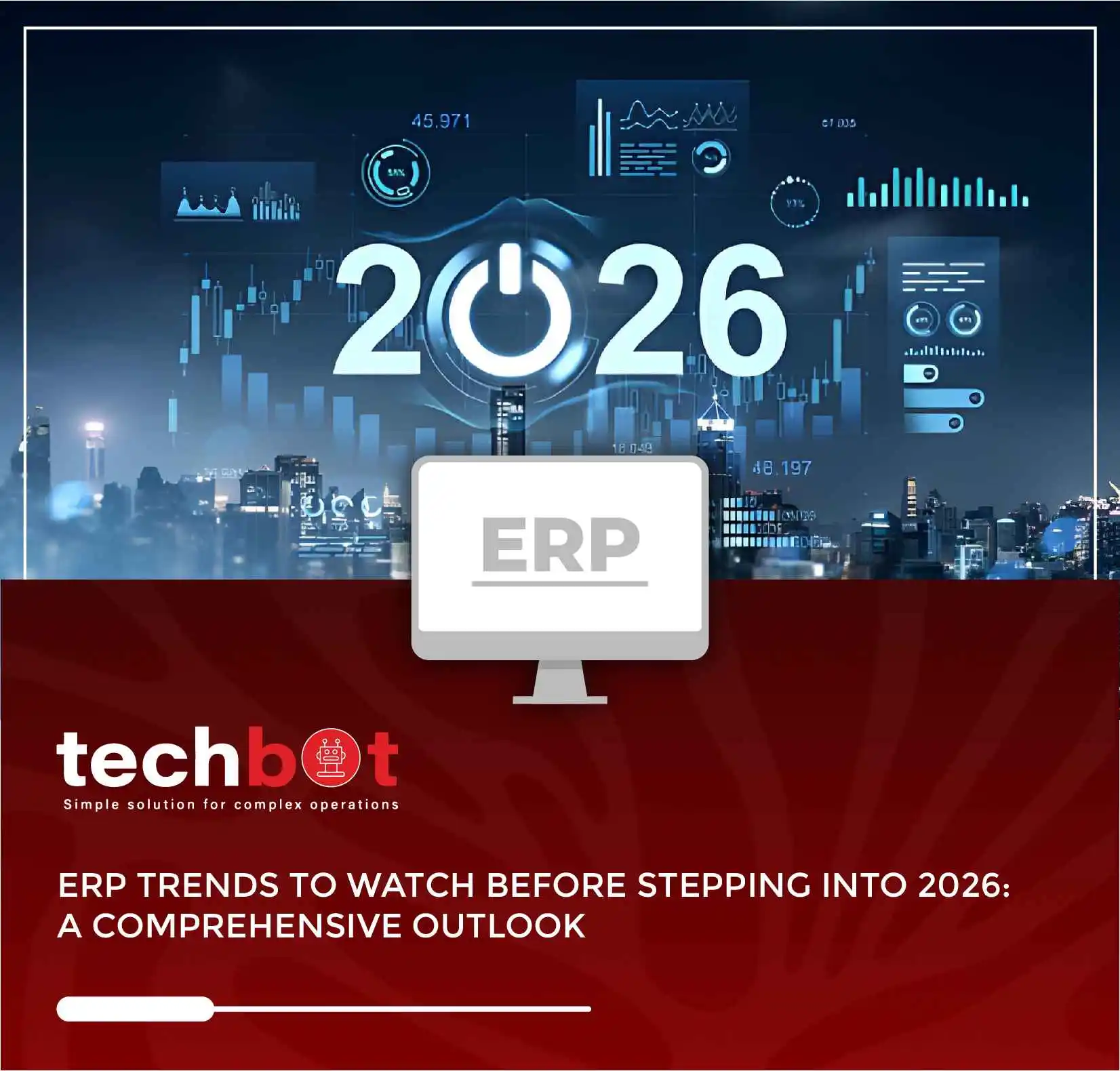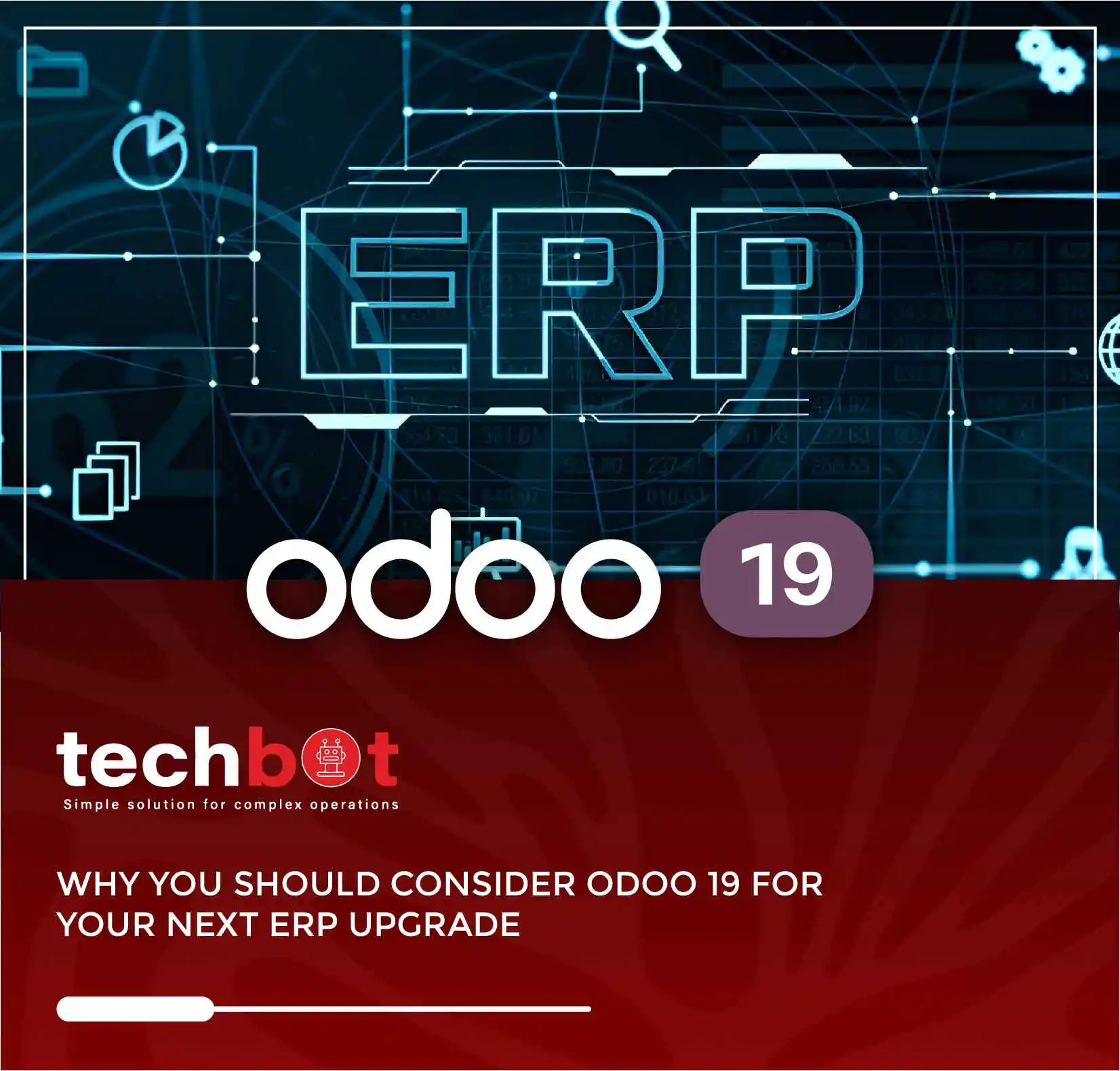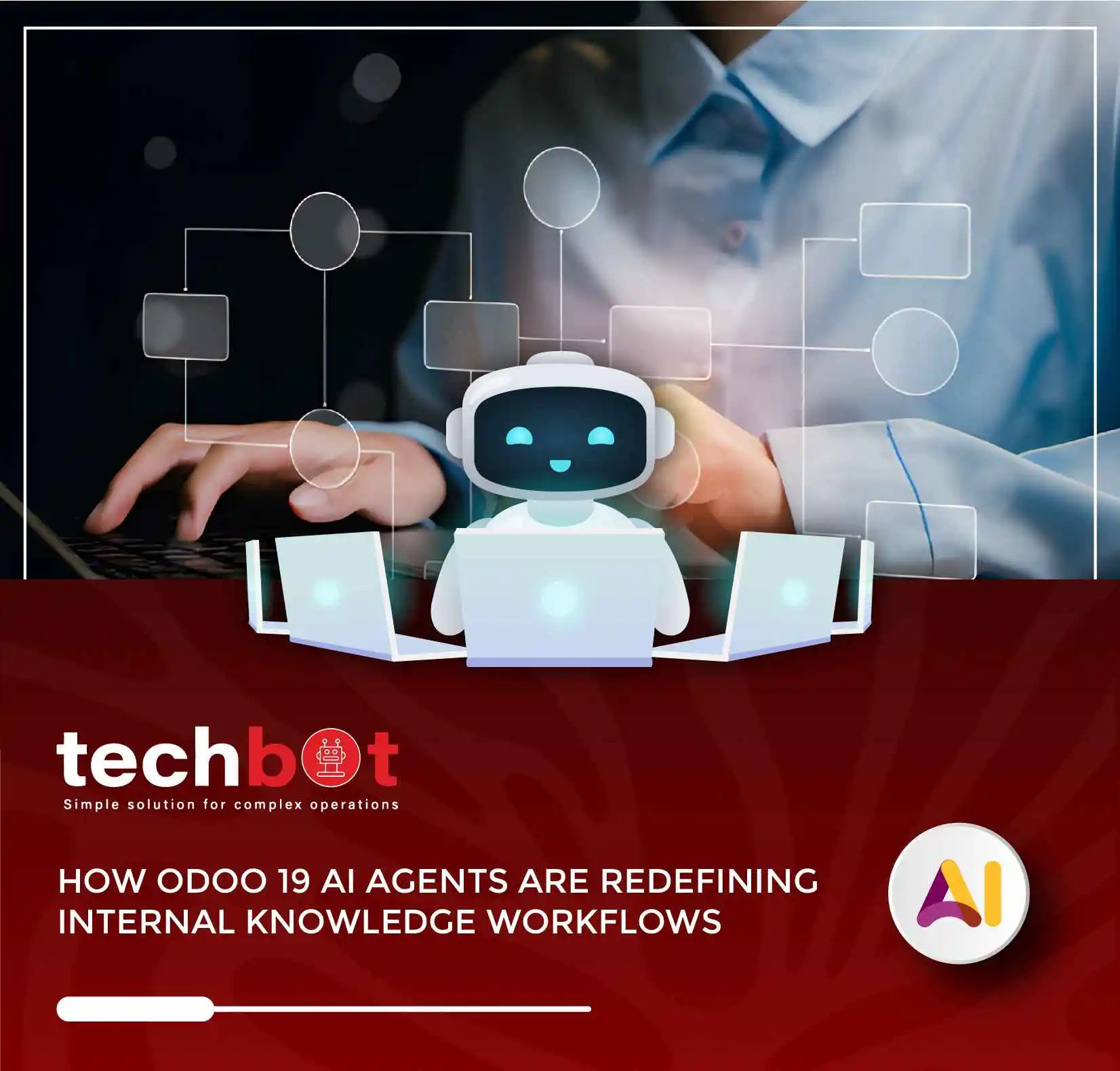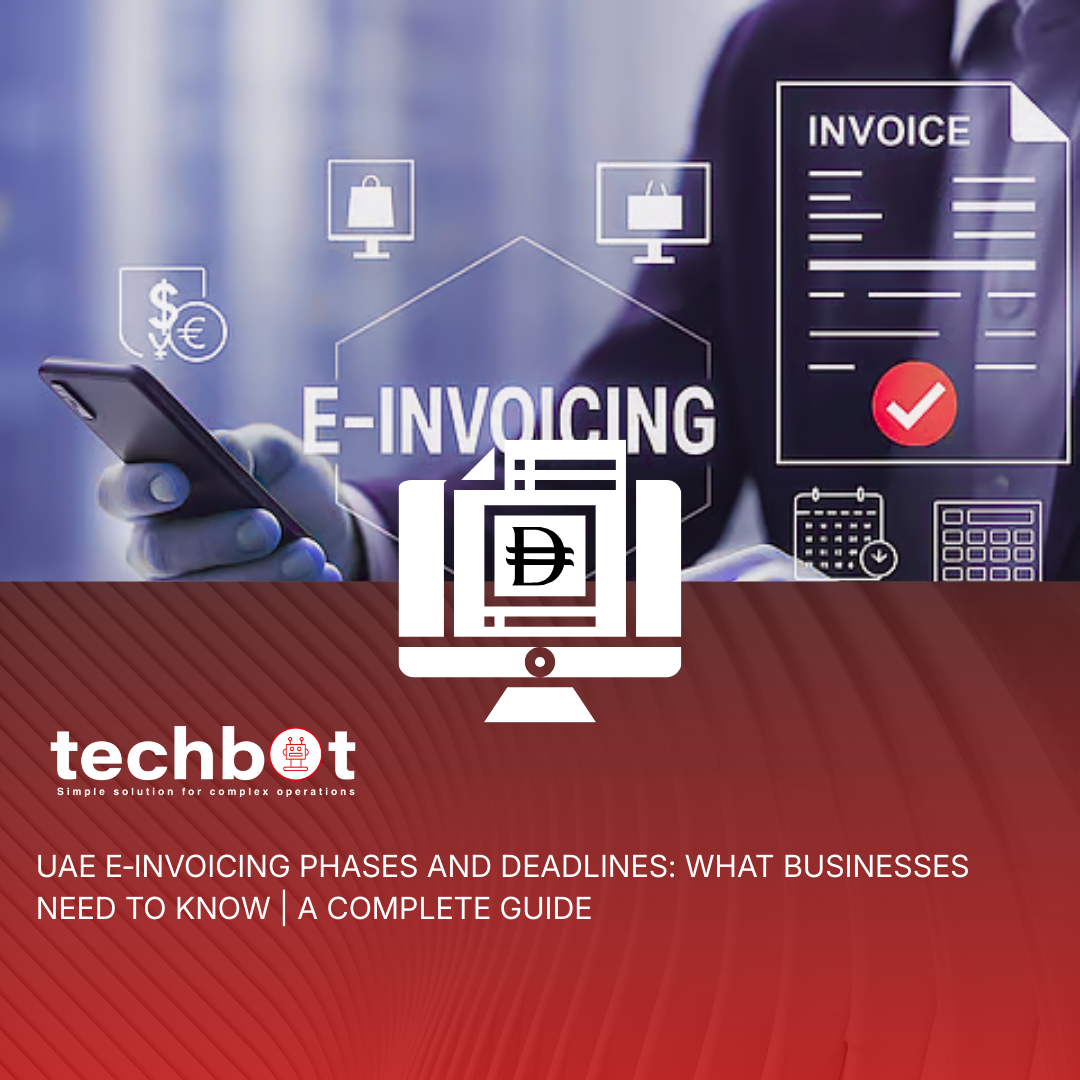UAE E‑Invoicing Phases and Deadlines: What Businesses Need to Know | A Complete Guide
UAE E‑Invoicing Phases and Deadlines: What Businesses Need to Know | A Complete Guide
Share this post
Latest Post
Recent Posts
- How our ERP solution simplifies multi property management
- UAE E‑Invoicing Phases and Deadlines: What Businesses Need to Know | A Complete Guide
- Odoo Pricing Guide for the UAE 2026 | Key Factors to Consider Before Your Implementation
- Why Clean Data Drives The Highest ROI In Real Estate ERP Projects
- ERP Trends To Watch Before Stepping Into 2026: A Comprehensive Outlook
- Importance Of ERP For Growth And Compliance In Real Estate
- Why You Should Consider Odoo 19 For Your Next ERP Upgrade
- Odoo 19 Migration For Real Estate: Benefits, Risks & Migration Checklist
- How AI Agents In Odoo 19 Are Revolutionizing Business Support
- Top 7 Odoo 19 AI Features Transforming Business Workflows
What Is UAE E‑Invoicing and Why Is It Being Introduced?
E-invoicing refers to the electronic creation, exchange, validation, and storage of invoices in a structured format (not PDF or paper). The UAE’s implementation is aligned with global digital tax strategies promoting:
- Real-time VAT validation
- Increased transparency and anti-fraud measures
- Automation of compliance and reporting
- Alignment with systems like KSA’s ZATCA and EU’s Peppol
The UAE’s chosen structure is the PINT AE (Peppol International UAE) standard, an XML-based format tailored for local regulations.
UAE E‑Invoicing Rollout Timeline
The Ministry of Finance has announced a phased rollout to ensure smooth nationwide adoption:
Phase 1: Pilot (Voluntary Participation)
- Starts 1 July 2026
- Open to early adopters to test systems and integrations
Phase 2: Mandatory for Large Taxpayers
- Applies to businesses with annual revenue ≥ AED 50 million
- Must appoint an ASP by 31 July 2026
- Mandatory go-live: 1 January 2027
Phase 3: Mandatory for All Other VAT-Registered Businesses
- Revenue < AED 50 million
- Must appoint ASP by 31 March 2027
- Go-live: 1 July 2027
Phase 4: B2G Transactions (Government Entities)
- ASP appointment by 31 March 2027
- Mandatory go-live: 1 October 2027
What are Accredited Service Providers (ASPs), aka The ‘Call Connectors’ of E‑Invoicing
To simplify this: think of an Accredited Service Provider (ASP) like your telecom provider for example, Etisalat or du.
When you make a phone call, your phone doesn’t connect directly to the recipient. Instead, the telecom provider validates, routes, and secures the connection.
E-invoicing follows the same principle:
- Your ERP system (like Odoo) creates the invoice.
- The ASP validates and transmits it to the UAE’s Federal Tax Authority (FTA).
- The FTA logs and accepts the transaction.
- The ASP’s job includes:
- Ensuring the invoice meets PINT AE format.
- Digitally signing and timestamping the invoice.
- Transmitting it in real time to the FTA.
- Archiving it according to UAE regulations.
Important Clarification: ERP ≠ ASP
A common misconception is that your ERP or invoicing system handles everything.
But even if you use a powerful system like Odoo, it’s not an ASP and cannot legally submit invoices to the FTA on its own.
Odoo = Invoice Creator
ASP = Invoice Validator + Transmitter
FTA = Official Receiver & Auditor
At Techbot, we help you integrate Odoo with FTA-approved ASPs, ensuring end-to-end e-invoicing compliance.
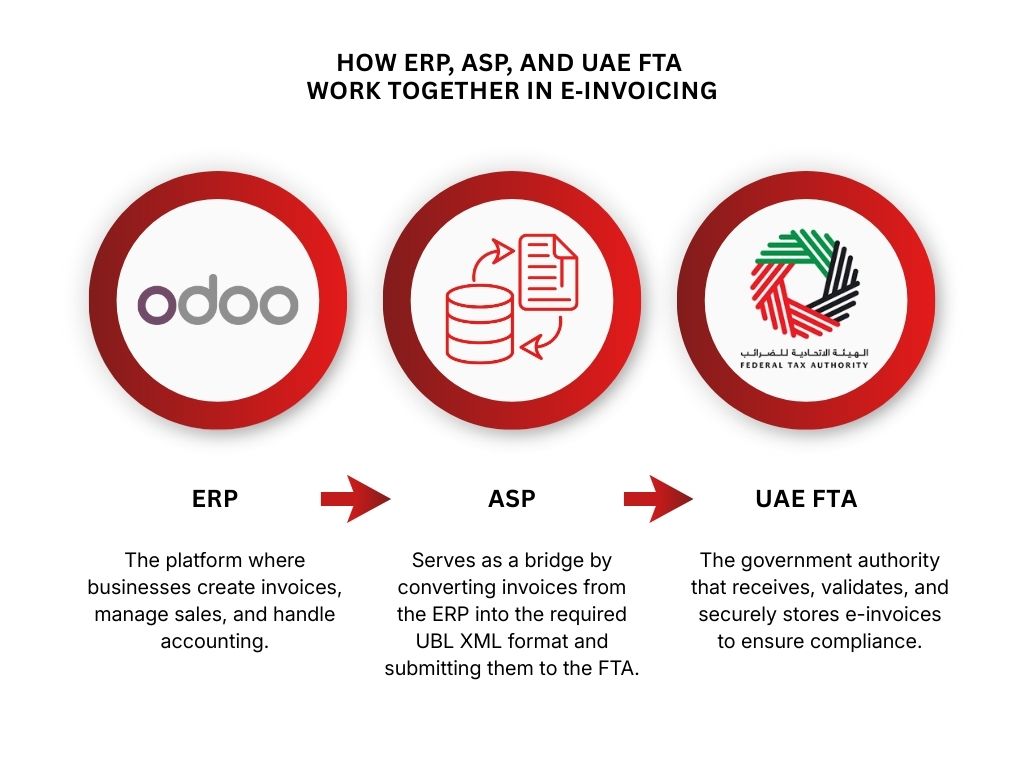
The PINT AE Format
PINT AE (Peppol International for the UAE) is the mandated e-invoice format machine-readable, highly structured, and legally binding.
It includes data like:
- Unique invoice number and timestamp
- Seller and buyer details (TRN, VAT, etc.)
- VAT breakdown
- Total values in AED
- Digital signature and ASP metadata
Paper and PDF invoices will no longer be acceptable once the mandate takes effect for your business segment.
Preparing Your Business for Compliance
Here’s how to stay ahead of the mandate:
- Review Your ERP System Ensure it can generate invoices in the PINT AE format and supports API integration with ASPs.
- Select a Certified ASP Choose an FTA-approved ASP early to allow testing, integration, and onboarding support.
- Integrate ERP + ASP Our team at Techbot ensures your Odoo ERP is integrated with your chosen ASP for real-time, compliant e-invoice flow.
- Train Finance & IT Teams Ensure everyone understands the new invoice flow, error handling, and audit trail requirements.
What Happens If You Don’t Comply?
Starting 2027, non-compliant businesses risk:
- FTA penalties for delayed onboarding
- Invoice rejections impacting payment cycles
- Loss of VAT input claims
- Exclusion from public tenders (B2G)
- Operational delays and audits
Benefits Beyond Compliance
- Faster invoice processing and payment
- Reduced manual reconciliation
- Real-time financial insights
- Stronger internal controls
- Readiness for future digital mandates
How Techbot + Odoo Empower You to Comply
As a certified Odoo Gold Partner, Techbot provides:
- Customized Odoo configurations for PINT AE invoice generation.
- Full ERP + ASP integration workflows.
- Real-time validation & error-handling tools.
- Training and onboarding support for your internal teams.
- Continuous updates as UAE regulations evolve.
Conclusion: Take Action Before the Mandate Hits
E-invoicing in the UAE isn’t a future problem it’s a present-day priority.
By preparing early, integrating with ASPs, and optimizing your ERP, you’ll not only avoid penalties you’ll drive efficiency, speed, and digital maturity across your business.
At Techbot, we’re here to help you achieve 100% compliance and unlock the value beyond it.
FAQs
Is Odoo an ASP?
No. Odoo is your ERP system. You need to connect it to an FTA-accredited ASP to submit invoices.
What is the ASP’s exact role?
Validate, digitally sign, and submit your invoices to the FTA in real time.
Can I still use PDF invoices?
No. Only PINT AE-formatted XML invoices submitted via ASP will be accepted once the mandate starts.
When does the UAE e-invoicing mandate become mandatory?
- 1 January 2027 for large businesses (annual revenue ≥ AED 50 million)
- 1 July 2027 for others
- 1 October 2027 for B2G transactions (businesses dealing with government entities)
How can Techbot help?
We integrate your Odoo ERP with certified ASPs, configure PINT AE invoicing, train your teams, and ensure full compliance.
Why is e-invoicing mandatory in the UAE?
The FTA mandates UAE electronic invoicing to improve transparency, reduce tax errors, and ensure accurate VAT reporting across all registered businesses.
Who sets the e-invoicing requirements in the UAE?
The Federal Tax Authority (FTA) defines all UAE e-invoicing requirements, including invoice format, submission process, and compliance timelines.
How does UAE e-invoicing affect VAT compliance?
With UAE electronic invoicing, all invoices are digitally tracked by the FTA, making VAT reporting and compliance more accurate and easier to audit.
Can e-invoicing in the UAE be done without an ASP?
No. All UAE e-invoicing requirements mandate that invoices be submitted via an FTA-accredited ASP in the correct PINT AE XML format.
As defined by the Federal Tax Authority for UAE electronic invoicing and VAT compliance.
Transform the way you manage projects, sales, and finance with Odoo ERP designed for UAE real estate management.


Get the latest tips and updates on ERP software solutions. Subscribe to our newsletter and stay ahead in business!
Latest Post
Recent Posts
- How our ERP solution simplifies multi property management
- UAE E‑Invoicing Phases and Deadlines: What Businesses Need to Know | A Complete Guide
- Odoo Pricing Guide for the UAE 2026 | Key Factors to Consider Before Your Implementation
- Why Clean Data Drives The Highest ROI In Real Estate ERP Projects
- ERP Trends To Watch Before Stepping Into 2026: A Comprehensive Outlook
- Importance Of ERP For Growth And Compliance In Real Estate
- Why You Should Consider Odoo 19 For Your Next ERP Upgrade
- Odoo 19 Migration For Real Estate: Benefits, Risks & Migration Checklist
- How AI Agents In Odoo 19 Are Revolutionizing Business Support
- Top 7 Odoo 19 AI Features Transforming Business Workflows
What to read next
Odoo Pricing Guide for the UAE 2026 | Key Factors to Consider Before Your Implementation
Odoo Pricing Guide for the UAE 2026 | Key Factors to Consider Before Your Implementation
Moossa M. Alavi
Moossa M. Alavi is the Founder & CEO of Techbot ERP and Altamyz Advertising. He is a certified Odoo consultant with more than 27 years of experience in business, advertising, and ERP software. Moossa started his career in the UAE in 1997 with a well-known group in Abu Dhabi. Over the years, he built his own companies to help other businesses work better using technology. Moossa helps with customized ERP implementation for various industries, including manufacturing, insurance, supercar rental, and logistics, through Techbot ERP. He resolves these issues with Odoo ERP and supports businesses in growing with the right assets and guidance. Moossa has received many awards for his work, including the Arabian Best of Best Award and the Industry Leader Award from BNI UAE. He is also a BNI Ambassador and mentors other business owners. He believes in giving back to the community and helping others grow, following the “Givers Gain” principle.
Share this post
Latest Post
Recent Posts
- How our ERP solution simplifies multi property management
- UAE E‑Invoicing Phases and Deadlines: What Businesses Need to Know | A Complete Guide
- Odoo Pricing Guide for the UAE 2026 | Key Factors to Consider Before Your Implementation
- Why Clean Data Drives The Highest ROI In Real Estate ERP Projects
- ERP Trends To Watch Before Stepping Into 2026: A Comprehensive Outlook
- Importance Of ERP For Growth And Compliance In Real Estate
- Why You Should Consider Odoo 19 For Your Next ERP Upgrade
- Odoo 19 Migration For Real Estate: Benefits, Risks & Migration Checklist
- How AI Agents In Odoo 19 Are Revolutionizing Business Support
- Top 7 Odoo 19 AI Features Transforming Business Workflows
Disclaimer:
This blog does not provide exact figures. Instead, it outlines the key factors you should consider when evaluating your Odoo implementation budget.
Read the TL;DR version (quick summary)
Understanding What Influences Your Odoo Pricing
Before diving into the details of Odoo pricing, it’s important to understand that no two businesses will have the exact same cost. Odoo’s pricing structure depends on several variables, and because every business has different workflows, team sizes, and module needs, giving a single fixed estimate is impossible.
If you’re trying to estimate your Odoo cost in the UAE, this guide gives a clear breakdown of every factor that affects the final price. These essentials we detail determine the baseline of your Odoo cost and are the first things you should consider when estimating your budget.
Below, we break down these key factors to help you understand what impacts your Odoo pricing the most.
Number of Users
Pricing is per user/month.
More users = higher subscription cost.
A user is any person who needs backend access to Odoo to do things like:
- Create or edit records
- Approve tasks
- Manage inventory
- Send invoices
- Update CRM deals
- Run reports
- Access settings
Who does NOT count as a user?
Employees who only use a portal.
Portal access is free. Portal users can log in to a simple interface that lets them view their documents, track orders, check tickets, and approve or comment when allowed.
Typical real-world example
A company with 100 employees may only need 7–15 actual Odoo users, such as:
- 3 salespeople
- 2 accountants
- 2 operations staff
- 1 HR admin
- 1 manager
The rest of the company never logs into the backend, so they don’t need user licenses.
Implementation
Even though Odoo provides the software, most businesses rely on
certified Odoo partners to set up the system correctly,
customize workflows, and ensure a smooth transition.
Here’s how we handle Odoo Implementation!
These four subcategories break down the implementation in terms of cost :-
1. Modules
When you buy the standard Odoo plan, you get all 12 core modules (listed below). You only pay for additional ones.
However, modules can affect your total cost indirectly:
- Implementation effort – Using many modules may require more setup, configuration, or partner support.
- More users – If more staff need to access these modules, your per-user subscription cost goes up.
- Custom or third-party modules – Extra apps or custom features may have separate fees.
In short: Standard modules are included, but more users, setup, and custom apps can increase your total cost.
Modules included in the standard plan:
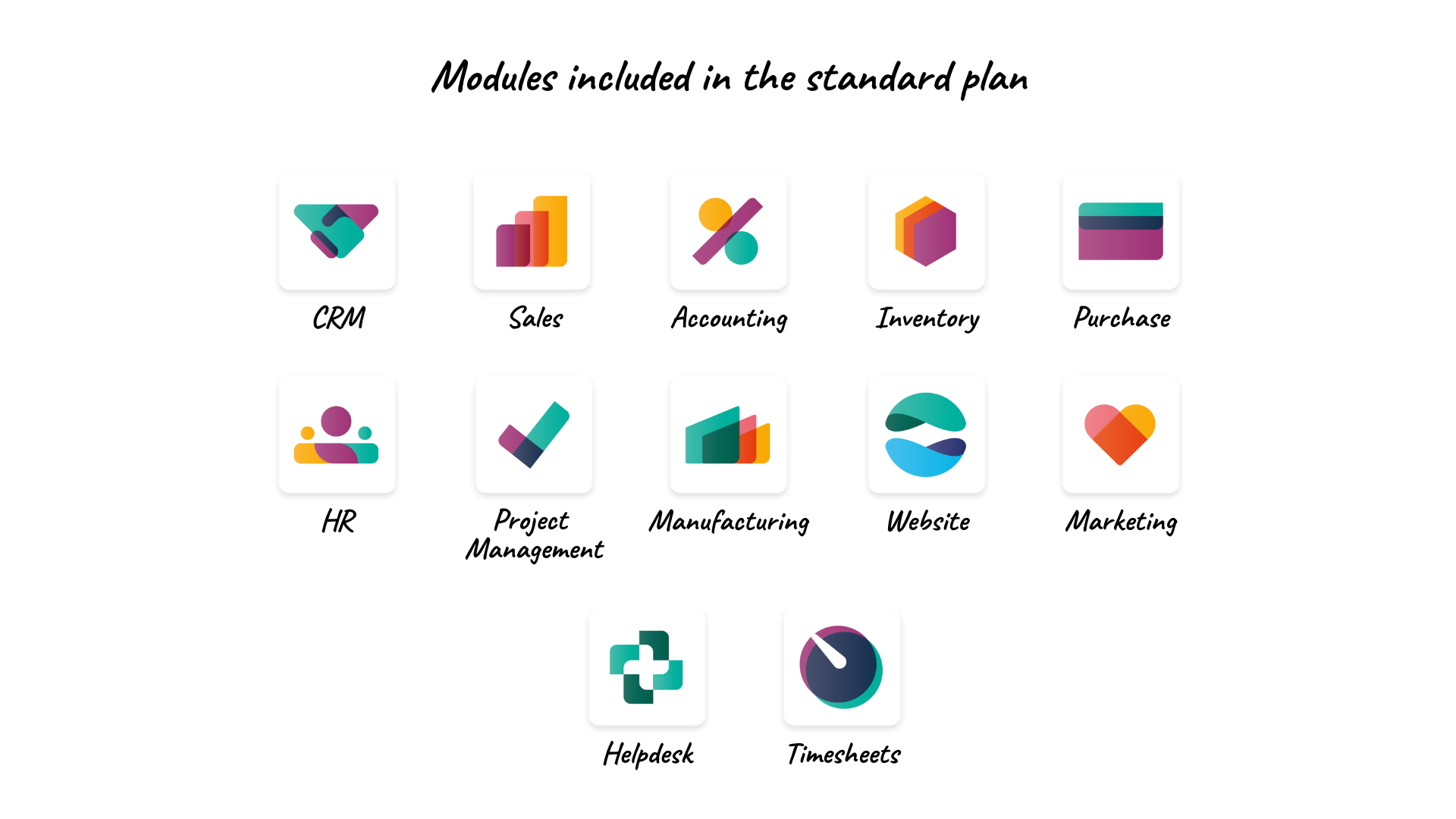
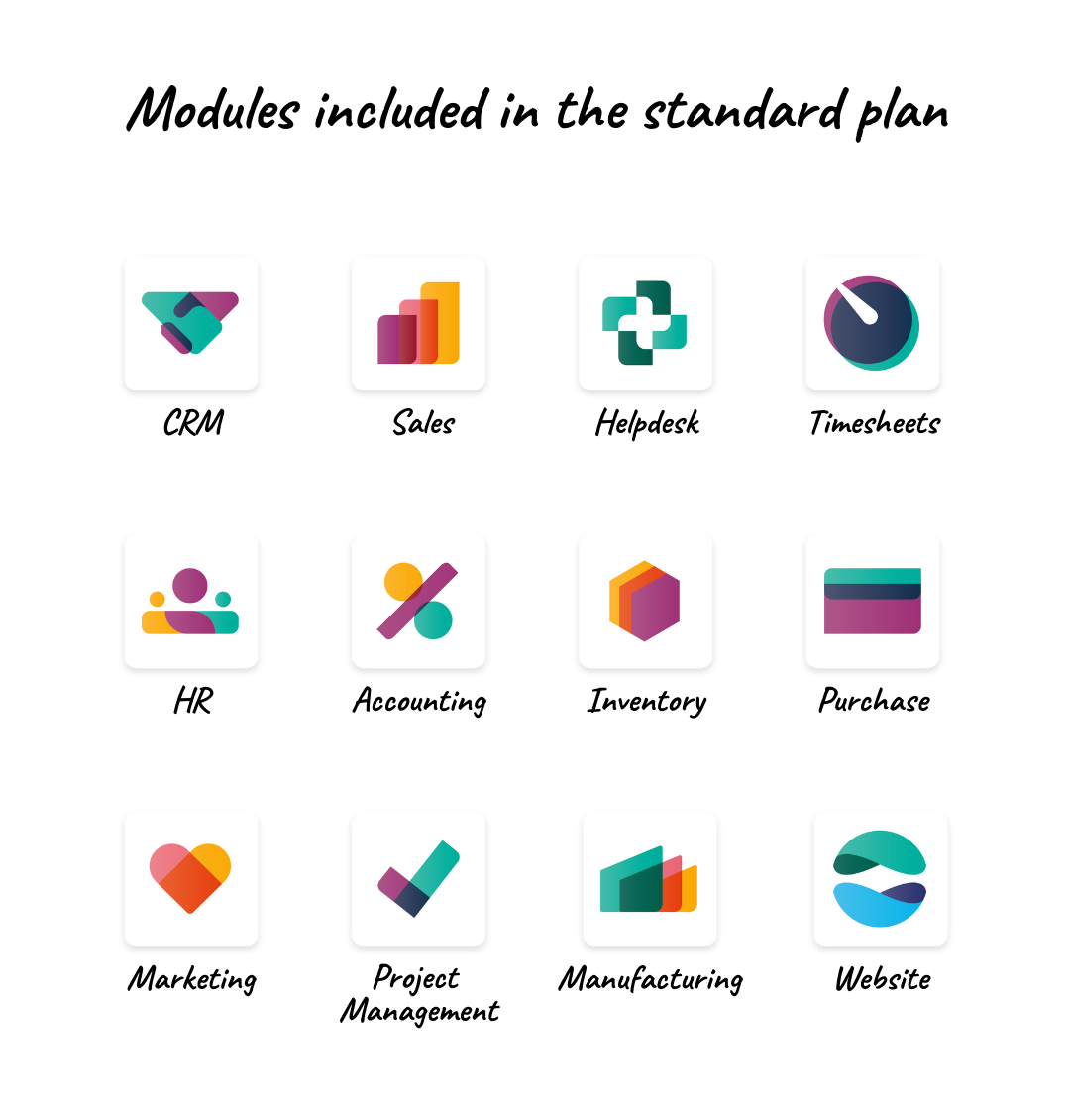
2. Customization Hours
The total time required to tailor Odoo to your specific workflows, add custom features, or modify existing modules to match your business needs.
3. On-site Man-days
The number of days our consultants spend at your location to configure the system, train staff, and ensure everything runs smoothly.
4. Number of companies
The total instances or business entities you plan to manage in Odoo, as each company may require separate configurations and data setup.
For a full overview of our Odoo services, visit our homepage!
Support / AMC
An AMC (Annual Maintenance Contract) is basically a yearly service agreement that ensures your Odoo system keeps working smoothly after the initial setup. In our case,
- We provide an initial support of 3 months for free.
- After that, clients can opt for an AMC, which is typically
25% of the implementation fees per year and provides ongoing, annual support.
Odoo Edition / Hosting Type
This refers to how and where your Odoo system is hosted, which affects both cost and setup.
You can choose:
1. Odoo Online (Cloud / SaaS) (FREE)
- Fully hosted by Odoo, with automatic updates, backups, and maintenance.
- Odoo Online is easy to use, but it doesn’t allow customizations.
2. Odoo.sh (Managed Cloud Platform)
- This is also hosted by Odoo, but unlike Odoo Online, it gives you full freedom to customize, install your own modules, and develop anything you need. While Odoo still handles hosting, backups, and server management for you.
3. Self-Hosted
- You manage everything yourself: server setup, updates, security, backups, and performance.
- It’s the best choice for businesses that need deep customization, full data control, or specific infrastructure requirements.
4. Partner Managed Hosting
- Your partner provides the server, handles setup, takes care of maintenance, monitors performance, applies updates, and manages backups. Giving you a fully managed, worry-free environment tailored to your needs.
Partner Support
What Partners Do That Odoo Doesn’t
We handle tasks that Odoo alone does not:
- Custom configuration of modules and workflows to fit your unique business processes
- Data migration from legacy systems or spreadsheets
- Integration with other software your company uses
- Training employees so they can use the system efficiently
- Ongoing support and troubleshooting for issues specific to your setup
- Ensuring best practices that reduce errors and maximize ROI
In short: partners bridge the gap between the software and your actual business operations, making sure Odoo works for your specific needs.
Support levels
- Basic setup – A simple installation and configuration for small businesses, generally the lowest partner cost.
- Full implementation – Complete setup, data migration, training, and ongoing support for medium to large companies, which commands a higher price.
For precise, personalized pricing, reach out to us and we’ll guide you!
Transform the way you manage projects, sales, and finance with Odoo ERP designed for UAE real estate management.

TL;DR: Odoo Pricing Guide for the UAE
- Costs vary by business:
No two companies have the same price; depends on users, modules, customization, and implementation needs. - Users matter:
Only backend users count for subscription; portal users are free. - Implementation:
Partners help with module setup, customization, on-site support, and managing multiple companies. Learn more - Support / AMC:
Initial 3 months free, then optional AMC (≈25% of implementation fees per year) for ongoing support. Details here - Hosting options:
Odoo Online (cloud), Odoo.sh (managed cloud), Self-Hosted, or Partner Managed Hosting.
Each has different flexibility and cost. - Partner support adds value: Custom workflows, data migration, integrations, employee training, ongoing troubleshooting, and best practices.
- Support levels:
Basic setup (small businesses) vs Full implementation (medium–large businesses).

Get the latest tips and updates on ERP software solutions. Subscribe to our newsletter and stay ahead in business!
Latest Post
Recent Posts
- How our ERP solution simplifies multi property management
- UAE E‑Invoicing Phases and Deadlines: What Businesses Need to Know | A Complete Guide
- Odoo Pricing Guide for the UAE 2026 | Key Factors to Consider Before Your Implementation
- Why Clean Data Drives The Highest ROI In Real Estate ERP Projects
- ERP Trends To Watch Before Stepping Into 2026: A Comprehensive Outlook
- Importance Of ERP For Growth And Compliance In Real Estate
- Why You Should Consider Odoo 19 For Your Next ERP Upgrade
- Odoo 19 Migration For Real Estate: Benefits, Risks & Migration Checklist
- How AI Agents In Odoo 19 Are Revolutionizing Business Support
- Top 7 Odoo 19 AI Features Transforming Business Workflows
What to read next
Why Clean Data Drives The Highest ROI In Real Estate ERP Projects
Why Clean Data Drives The Highest ROI In Real Estate ERP Projects
Moossa M. Alavi
Moossa M. Alavi is the Founder & CEO of Techbot ERP and Altamyz Advertising. He is a certified Odoo consultant with more than 27 years of experience in business, advertising, and ERP software. Moossa started his career in the UAE in 1997 with a well-known group in Abu Dhabi. Over the years, he built his own companies to help other businesses work better using technology. Moossa helps with customized ERP implementation for various industries, including manufacturing, insurance, supercar rental, and logistics, through Techbot ERP. He resolves these issues with Odoo ERP and supports businesses in growing with the right assets and guidance. Moossa has received many awards for his work, including the Arabian Best of Best Award and the Industry Leader Award from BNI UAE. He is also a BNI Ambassador and mentors other business owners. He believes in giving back to the community and helping others grow, following the “Givers Gain” principle.
Share this post
Latest Post
Recent Posts
- How our ERP solution simplifies multi property management
- UAE E‑Invoicing Phases and Deadlines: What Businesses Need to Know | A Complete Guide
- Odoo Pricing Guide for the UAE 2026 | Key Factors to Consider Before Your Implementation
- Why Clean Data Drives The Highest ROI In Real Estate ERP Projects
- ERP Trends To Watch Before Stepping Into 2026: A Comprehensive Outlook
- Importance Of ERP For Growth And Compliance In Real Estate
- Why You Should Consider Odoo 19 For Your Next ERP Upgrade
- Odoo 19 Migration For Real Estate: Benefits, Risks & Migration Checklist
- How AI Agents In Odoo 19 Are Revolutionizing Business Support
- Top 7 Odoo 19 AI Features Transforming Business Workflows
The UAE real estate market is moving faster than ever. Developers are launching new communities, off plan units are selling rapidly, and customers expect clear information at every stage. Every sale, reservation, payment plan, handover, and compliance update depends on one foundation. Clean, accurate, and consistently maintained data. Yet many real estate teams in the UAE discover the same issue when they begin planning for ERP. Their internal data is scattered across spreadsheets, WhatsApp threads, PDFs, old CRMs, and disconnected legacy systems.
Before choosing any ERP system, whether Odoo, Oracle, SAP, or a real estate-specific platform, the first question leaders should ask is simple. Is our data ready for ERP? This is exactly where Techbot, your ERP growth partner in the UAE, brings clarity. Techbot has supported many developers and brokers across the region and has seen a clear pattern. When data is clean and consistent, ERP delivers measurable ROI from the first week. When data is messy or incomplete, teams spend months fixing issues before they can focus on growth.
This blog explains why data quality matters more than technology, why messy data slows down ERP projects, and the steps UAE real estate companies should take to prepare their data for a successful digital transformation journey.
Why Data Quality Matters in Real Estate Before an ERP Implementation
Real estate operations involve thousands of moving parts. Unit availability, pricing, customer records, commission structures, payment milestones, service charges, RERA documents, and financial entries all depend on accurate information. When data is clean, ERP becomes a powerful engine for performance and decision-making. When it is not, even the most advanced ERP fails to deliver reliable outcomes.
Clean data ensures that what teams see on the system reflects what is happening on the ground. It eliminates confusion between departments and removes the guesswork that slows down sales and operations. It also builds trust within the team because they know the ERP is showing the correct information. This sets the stage for faster adoption and smoother teamwork.
When the data foundation is strong, every ERP feature works smoothly. When the foundation is weak, the technology only exposes deeper problems.
Preparing your data before ERP ensures:
1. Faster implementation timelines
Clean data reduces rework and allows teams to complete validation cycles without delays.
2. Better user adoption
Teams trust the system when the information inside is accurate from day one.
3. Clearer financial reporting
Clean financial, customer, and unit data improves reconciliation, forecasting, and compliance reporting.
4. Accurate customer experiences
No more selling an unavailable unit, issuing incorrect invoices, or duplicating client records.
This reflects the primary keyword: why data quality matters in real estate before ERP. The real power of ERP comes only when the foundation is strong.
Transform the way you manage projects, sales, and finance with Odoo ERP designed for UAE real estate management.

The Hidden Cost of Messy Data in UAE Real Estate Companies
Most real estate companies in the UAE do not struggle because their ERP software is difficult. They struggle because their internal data is not ready to support the system. In many implementations, Techbot has observed that more than seventy percent of delays are caused by unstructured or inaccurate data. When teams rely on multiple versions of the same information, ERP cannot unify the business.
Messy data does more damage than most leaders realize. It slows down project timelines, creates accountability gaps, and leads to customer escalations. Incorrect unit availability can ruin sales deals. Duplicate customer entries can cause compliance issues. Missing payment schedules can trigger invoicing errors. All these problems increase the operational load and reduce the effectiveness of the ERP.
The UAE market moves quickly, and customers expect clarity. Poor data quality increases risk and makes it harder for leaders to rely on their reports during important decisions.
Here are the most common real estate data problems UAE businesses face:
1. Duplicate customer profiles
Leads captured through portals, WhatsApp, walk-ins, and brokers create multiple entries for the same person.
2. Inconsistent unit inventory data
Different departments have different versions of available units, sold units, blocked units, and reserved units.
3. Missing payment plans and handover schedules
Without updated payment structures, ERPs cannot generate accurate invoices or reminders.
4. Unorganized contract documents
Unsigned, outdated, or misplaced contracts distort legal and compliance workflows.
5. Mismatched financial entries
Finance teams often deal with inconsistent chart-of-accounts mapping across legacy systems.
This is where the keyword how bad data slows real estate teams becomes a real operational pain point. A small mistake in unit details or customer information can disrupt the entire property sale cycle.
Clean and Accurate Property Data Delivers Real ROI from Day One
Many companies assume ERP ROI appears after the system goes live. In reality, the strongest ROI begins long before go live when property, customer, and financial data becomes clean and organized. When data is accurate, everything from unit booking to invoicing to payment follow up becomes smoother.
Clean data gives teams confidence to shift from manual work to structured ERP workflows. It reduces repeated tasks and prevents errors that waste time. It also strengthens customer trust because documents, pricing, and invoices match what was promised. Finance teams benefit as well since accurate master data supports better forecasting and cash flow planning.
The true power of ERP becomes visible only when the information entering the system is reliable. Clean data multiplies efficiency and reduces friction across the organization.
Most companies believe ERP delivers ROI after implementation. However, real ROI begins before implementation, when property, financial, and customer data become consistent.
Better sales performance
Teams work with accurate unit and pricing information, reducing manual corrections and customer escalations.
Improved customer trust
Accurate invoices, payment plans, and receipts help maintain long-term relationships.
Reliable financial forecasting
Finance teams track cash flow accurately when legacy balances and outstanding amounts are aligned.
Stronger compliance reporting
RERA submissions, tax reports, and audit files require accurate property and customer records.
Clean data not only improves ERP readiness. It improves business performance even before the ERP goes live.
Data Readiness Before ERP Implementation: What Real Estate Should Prepare
Data readiness is the preparation stage that decides how successful the ERP project will be. Many businesses jump directly into technology implementation and ignore this step, which later leads to rework and delays. Preparing data early ensures that everyone uses the same information and that the ERP becomes a single source of truth across departments.
A structured readiness process helps teams understand what to clean, what to merge, and what to validate. It also brings clarity on data owners, responsibilities, and documentation. When every department prepares its data in a unified structure, the ERP flows smoothly without conflict between teams.
This preparation stage also improves decision-making because leaders can rely on accurate information even before the ERP launches.
No ERP project should begin without a clear data readiness before ERP implementation framework. Here is a checklist to evaluate before onboarding any ERP partner.
1. Clean your customer database
Merge duplicates, validate contact details, and structure leads based on source.
2. Standardize unit master data
Ensure unit numbers, categories, pricing, and availability are consistent across all documents.
3. Validate financial records
Reconcile balances, standardize GL codes, and clean vendor and customer ledgers.
4. Audit contract documents
Confirm that all Mutqan, SPA, tenancy, and leasing documents are up to date and correctly linked.
5. Structure your payment schedules
Ensure payment milestones match approved project timelines and sales agreements.
6. Organize attachments and files
Sort PDFs, images, and documents into proper folders with naming conventions.
Following these steps reduces migration risk and helps both business and ERP consultants work with confidence.
Real Estate Master Data Cleanup: The Step Most Companies Skip
Master data cleanup is often the most neglected stage of digital transformation in real estate. Developers focus on features and workflows but ignore inconsistent property lists, outdated customer records, scattered vendor information, and non-standard financial entries. When this data is loaded into the ERP, it creates confusion rather than clarity.
Master data cleanup ensures that unit lists, project details, customer information, payment plan structures, and contract templates follow a clean, unified format. This reduces problems during migration and ensures that the ERP behaves exactly the way the business expects. Cleanup also strengthens compliance and audit preparation since regulators expect accuracy in every document.
Many real estate developers and brokers in the UAE jump directly into ERP implementation without preparing real estate master data cleanup. This leads to major roadblocks later, such as:
Delayed go-live
Incorrect bookings and invoices
Mismatched customer balances
Confusion between sales and finance teams
Post-implementation firefighting
Master data cleanup includes standardizing:
Property and unit lists
Customer master
Vendor lists
Payment plans
Lease templates
Commission rules
When master data is clean, the ERP behaves exactly the way it should. When it is not, ERP becomes an expensive database instead of a business engine.
How Techbot Helps Real Estate Companies Build ERP-Ready Data
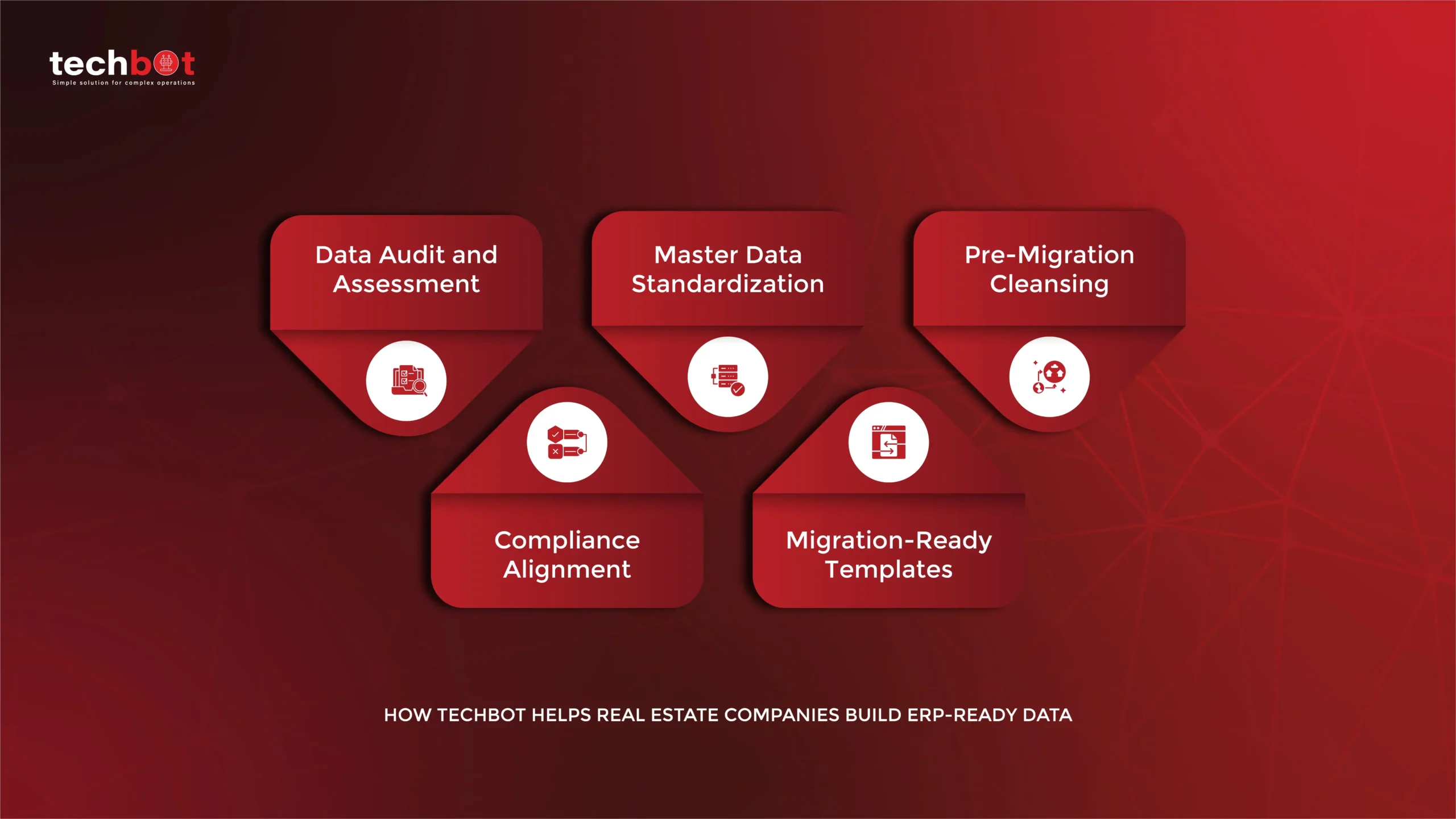
Techbot brings expertise in UAE property regulations, RERA guidelines, VAT rules, and real estate operational models. This allows Techbot to guide companies with a structured data readiness framework that works for developers, brokers, and property management businesses.
Techbot focuses on understanding the business model, identifying data inconsistencies, and helping teams move toward a unified structure. This approach helps companies avoid confusion during migration and ensures the ERP reflects how the business actually operates. It also helps departments work with confidence from day one.
With Techbot’s support, businesses build a strong data foundation that supports long-term growth and reduces the need for frequent corrections after go-live.
Data audit and assessment
Understanding gaps across sales, finance, CRM, and operations.
Master data standardization
Creating a unified format for units, properties, and customer records.
Pre-migration cleansing
Removing duplicates, correcting errors, and validating information.
Compliance alignment
Ensuring RERA, VAT, and audit documentation match your operational structure.
Migration-ready templates
Providing clean, ERP-compatible templates for all departments.
This ensures your ERP launch is smooth, predictable, and capable of producing real ROI without delays.
Clean Data Is the Real Foundation of Every Successful ERP Journey
Before any ERP system can transform a real estate business, the data behind it must be prepared to support that transformation. Companies that invest early in data quality experience predictable implementation timelines, stronger user adoption, and smoother operations. Those who skip this step face delays, misalignment, and unnecessary rework.
Techbot helps UAE developers, brokers, and property managers build this foundation with confidence. Through structured audits, cleanup frameworks, and market specific experience, Techbot ensures that your ERP begins with clarity and accuracy. Clean data strengthens your operations and improves every customer interaction. When your data is ready, your ERP becomes a reliable engine that supports long term real estate growth.

Get the latest tips and updates on ERP software solutions. Subscribe to our newsletter and stay ahead in business!
Latest Post
Recent Posts
- How our ERP solution simplifies multi property management
- UAE E‑Invoicing Phases and Deadlines: What Businesses Need to Know | A Complete Guide
- Odoo Pricing Guide for the UAE 2026 | Key Factors to Consider Before Your Implementation
- Why Clean Data Drives The Highest ROI In Real Estate ERP Projects
- ERP Trends To Watch Before Stepping Into 2026: A Comprehensive Outlook
- Importance Of ERP For Growth And Compliance In Real Estate
- Why You Should Consider Odoo 19 For Your Next ERP Upgrade
- Odoo 19 Migration For Real Estate: Benefits, Risks & Migration Checklist
- How AI Agents In Odoo 19 Are Revolutionizing Business Support
- Top 7 Odoo 19 AI Features Transforming Business Workflows
What to read next
ERP Trends To Watch Before Stepping Into 2026: A Comprehensive Outlook
ERP Trends to Watch Before Stepping into 2026: A Comprehensive Outlook
Moossa M. Alavi
Moossa M. Alavi is the Founder & CEO of Techbot ERP and Altamyz Advertising. He is a certified Odoo consultant with more than 27 years of experience in business, advertising, and ERP software. Moossa started his career in the UAE in 1997 with a well-known group in Abu Dhabi. Over the years, he built his own companies to help other businesses work better using technology. Moossa helps with customized ERP implementation for various industries, including manufacturing, insurance, supercar rental, and logistics, through Techbot ERP. He resolves these issues with Odoo ERP and supports businesses in growing with the right assets and guidance. Moossa has received many awards for his work, including the Arabian Best of Best Award and the Industry Leader Award from BNI UAE. He is also a BNI Ambassador and mentors other business owners. He believes in giving back to the community and helping others grow, following the “Givers Gain” principle.
Share this post
Latest Post
Recent Posts
- How our ERP solution simplifies multi property management
- UAE E‑Invoicing Phases and Deadlines: What Businesses Need to Know | A Complete Guide
- Odoo Pricing Guide for the UAE 2026 | Key Factors to Consider Before Your Implementation
- Why Clean Data Drives The Highest ROI In Real Estate ERP Projects
- ERP Trends To Watch Before Stepping Into 2026: A Comprehensive Outlook
- Importance Of ERP For Growth And Compliance In Real Estate
- Why You Should Consider Odoo 19 For Your Next ERP Upgrade
- Odoo 19 Migration For Real Estate: Benefits, Risks & Migration Checklist
- How AI Agents In Odoo 19 Are Revolutionizing Business Support
- Top 7 Odoo 19 AI Features Transforming Business Workflows
The ERP market is entering a decisive phase. Decision makers expect systems that do more than record transactions. They want platforms that understand context, surface patterns, and help teams act with confidence. According to a Statista report, the global ERP market is projected to reach nearly 81 billion USD by 2026, driven by cloud ERP adoption, AI integration, and next-generation analytics.
At Techbot ERP, your ERP growth partner, we help businesses understand not only where the ERP market is heading, but how to make these trends work for them. As we move toward 2026, ERP is transforming into a decision-intelligent platform that enhances visibility, connects operations, and empowers leadership to act in real time.
ERP is no longer a back-office tool. It is becoming the intelligent command center of every growing organization. Companies that prepare now for this shift will not only modernize workflows but also gain a strategic edge in digital transformation.
Why 2026 Is a Turning Point for ERP Systems
Enterprise systems are evolving from data entry to decision-intelligent ecosystems. A recent Gartner analysis suggests that by 2026, over 70% of new ERP deployments will use AI-enhanced modules for planning, forecasting, and compliance.
This shift is redefining ERP future trends from transactional processing to predictive, connected decision-making. Companies adopting this mindset will lead digital transformation, while those staying on legacy systems risk falling behind faster, data-driven competitors.
Businesses are realizing that ERP is not just an IT investment but a growth enabler. The systems of 2026 will shape business agility, empower leaders with insights, and simplify decision-making across every layer of the organization.
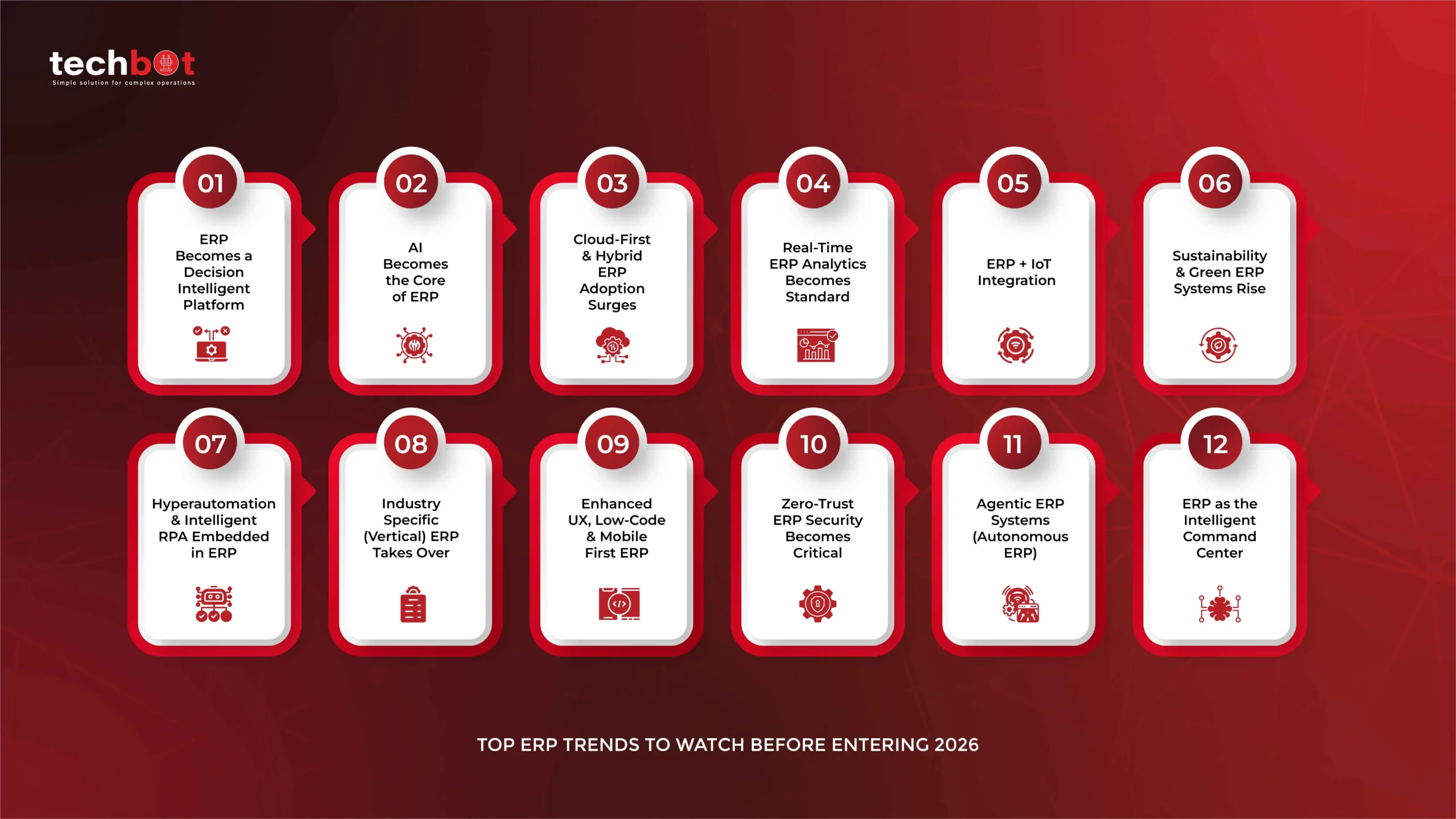
AI Is No Longer Optional in ERP Platforms
Artificial intelligence is now the foundation of modern ERP. According to IBM, AI in ERP 2026 will automate up to 60% of manual decision processes across finance, procurement, and customer management.
AI-enabled ERP software improves accuracy and speeds up operations. Predictive analytics optimize cash flow and supply chain decisions, while AI assistants handle repetitive tasks such as invoice matching or lead qualification. Real-time ERP analytics convert raw data into actionable insights, improving both speed and quality of decision-making.
The coming years will see AI become the connective tissue of enterprise systems. It will guide employees through intelligent prompts, generate recommendations, and ensure that every workflow is optimized for speed, accuracy, and cost efficiency.
The Shift Toward Cloud-First and Hybrid ERP Architectures
Cloud ERP adoption is growing rapidly. A DocuClipper ERP report shows that by 2026, 70% of new ERP implementations will be cloud-based, providing scalability, flexibility, and lower maintenance costs.
At the same time, industries with data-sensitive operations are exploring hybrid ERP models, combining the security of on-prem systems with the agility of cloud analytics. This blended model supports multi-site coordination and ensures that critical data remains under organizational control while still benefiting from next-gen ERP systems.
Cloud ERP will become the backbone of continuous innovation. Businesses that migrate early will enjoy faster updates, better data integration, and reduced infrastructure costs, setting the foundation for long-term scalability.
Real-Time Analytics and Business Intelligence Take Center Stage
In the past, ERP systems focused on historical data. The next wave emphasizes real-time ERP analytics, offering leaders live visibility into performance metrics and financial health.
According to Apps Run the World, companies using real-time dashboards report 25% faster decision cycles and 30% improvement in operational efficiency. Integrated KPI tracking, anomaly alerts, and predictive reporting will become default features in 2026.
Real-time ERP systems bring accuracy and agility together. Leaders can make faster decisions with confidence, while teams access instant insights across every department from procurement to sales to finance, ensuring a single source of truth.
ERP Meets IoT — The Smart Manufacturing Revolution
The convergence of ERP and IoT is revolutionizing industrial operations. According to BJIT Group Research, more than 60% of manufacturers already use IoT-linked ERP for equipment monitoring and predictive maintenance.
IoT sensors feed live data into ERP, allowing real-time responses to downtime, stock levels, and energy usage. This real-time ERP insight helps optimize production schedules and improve supply chain coordination, leading to higher output and lower costs.
With IoT connectivity, organizations move from reactive to proactive decision-making. Predictive maintenance, connected logistics, and machine learning analytics are redefining how manufacturers measure efficiency and profitability.
Get the latest tips and updates on ERP software solutions. Subscribe to our newsletter and stay ahead in business!

Sustainability and Green ERP Systems
ESG integration has become a strategic requirement, not just a reporting need. Modern ERP systems now include carbon tracking, waste optimization, and automated sustainability dashboards.
An SAP report highlights that organizations using ESG-enabled ERP platforms have reduced compliance preparation time by 40%. These systems consolidate sustainability metrics alongside financial performance, aligning growth with responsibility.
Sustainability in ERP is now tied to corporate performance. Real-time visibility into carbon data allows companies to meet environmental targets while strengthening brand trust and investor confidence.
Hyperautomation and Intelligent RPA
The era of repetitive manual processing is ending. ERP vendors are embedding AI-driven hyperautomation to accelerate operations across procurement, finance, and HR.
A Forrester study reveals that 70% of enterprises will use RPA integrated with AI by 2026. Hyperautomation transforms ERP from workflow support into an intelligent orchestrator, identifying inefficiencies, automating approvals, and managing exceptions autonomously.
With hyperautomation, enterprises save time and ensure data consistency. The combined power of RPA, AI, and process mining enables end-to-end optimization that reshapes how business units collaborate and deliver value.
Industry-Specific ERP Platforms
Generic ERP is being replaced by industry-customized solutions with pre-configured modules and compliance support.
Sectors like healthcare, manufacturing, retail, and real estate increasingly rely on vertical ERP solutions to manage complex regulations and local market nuances.
Reports from NetSuite and Alphabold show that vertical ERP adoption cuts implementation time by up to 35% and reduces the need for costly customization.
Industry-specific ERP platforms allow businesses to start faster with built-in logic. These systems speak the language of the sector, minimizing configuration time while ensuring compliance and accuracy from day one.
Enhanced User Experience and Mobile ERP
User experience defines ERP success. Low-code and mobile-first interfaces make ERP accessible to non-technical users, improving adoption rates across departments.
By 2026, nearly 75% of enterprise apps will be built using low-code or no-code tools, according to Kissflow Research.
AI-driven personalization, natural language search, and voice-enabled commands are becoming standard across next-gen ERP systems, enabling faster responses and reducing training time.
Modern ERP is becoming as intuitive as consumer applications. Better UX ensures employees spend less time navigating software and more time making decisions that drive revenue and efficiency.
ERP Security and Zero-Trust Architecture
Security remains a top concern. A PwC cybersecurity report warns that ERP systems are now prime targets for AI-driven attacks.
By 2026, companies must adopt zero-trust ERP frameworks with identity validation, encryption, and continuous monitoring.
Integrating AI in ERP 2026 for threat detection and anomaly analysis will help organizations protect sensitive data while meeting GDPR and regional compliance mandates.
Future-ready ERP systems will combine predictive threat intelligence with real-time analytics to safeguard transactions and ensure uninterrupted operations across the enterprise.
Preparing for the Agentic ERP Era
As we step into 2026, ERP will evolve into agentic systems, intelligent assistants capable of taking action on behalf of users. AI agents will resolve invoices, predict demand, and trigger automated actions in connected workflows.
This evolution marks the beginning of autonomous ERP, where technology supports leadership in making accurate and timely business decisions. Techbot ERP helps organizations transition toward this model by combining expertise in AI integration, ERP security, and process intelligence.
Agentic ERP brings proactive intelligence to the enterprise. It allows organizations to move from data monitoring to data-driven execution, creating a truly connected and autonomous workflow platform.
Building the Foundation for the Future of ERP
The future of ERP software is not about adding more modules or dashboards. It is about building systems that think, learn, and adapt alongside your business. As AI, cloud ERP adoption, and real-time ERP analytics continue to shape enterprise strategy, 2026 will mark the rise of organizations that operate with precision, speed, and intelligence.
Techbot ERP partners with these forward-thinking businesses to design and deploy intelligent ERP systems that are secure, connected, and purpose-built for long-term success. By integrating AI-driven automation and predictive analytics, Techbot helps decision-makers move from data collection to data confidence, where every process drives measurable growth.
The companies that adopt these ERP trends for 2026 will become the benchmark for digital excellence. They will transform workflows into intelligent ecosystems, where every transaction, customer interaction, and insight fuels business agility. The journey toward smarter, autonomous ERP systems is already underway, and those who act today will define the most efficient, data-empowered enterprises of tomorrow.
In this transformation, Techbot ERP stands as more than a technology provider; it is your trusted growth partner in shaping the future of enterprise intelligence.

Get the latest tips and updates on ERP software solutions. Subscribe to our newsletter and stay ahead in business!
Latest Post
Recent Posts
- How our ERP solution simplifies multi property management
- UAE E‑Invoicing Phases and Deadlines: What Businesses Need to Know | A Complete Guide
- Odoo Pricing Guide for the UAE 2026 | Key Factors to Consider Before Your Implementation
- Why Clean Data Drives The Highest ROI In Real Estate ERP Projects
- ERP Trends To Watch Before Stepping Into 2026: A Comprehensive Outlook
- Importance Of ERP For Growth And Compliance In Real Estate
- Why You Should Consider Odoo 19 For Your Next ERP Upgrade
- Odoo 19 Migration For Real Estate: Benefits, Risks & Migration Checklist
- How AI Agents In Odoo 19 Are Revolutionizing Business Support
- Top 7 Odoo 19 AI Features Transforming Business Workflows
What to read next
Why You Should Consider Odoo 19 For Your Next ERP Upgrade
Why You Should Consider Odoo 19 For Your Next ERP Upgrade
Moossa M. Alavi
Moossa M. Alavi is the Founder & CEO of Techbot ERP and Altamyz Advertising. He is a certified Odoo consultant with more than 27 years of experience in business, advertising, and ERP software. Moossa started his career in the UAE in 1997 with a well-known group in Abu Dhabi. Over the years, he built his own companies to help other businesses work better using technology. Moossa helps with customized ERP implementation for various industries, including manufacturing, insurance, supercar rental, and logistics, through Techbot ERP. He resolves these issues with Odoo ERP and supports businesses in growing with the right assets and guidance. Moossa has received many awards for his work, including the Arabian Best of Best Award and the Industry Leader Award from BNI UAE. He is also a BNI Ambassador and mentors other business owners. He believes in giving back to the community and helping others grow, following the “Givers Gain” principle.
Share this post
Latest Post
Recent Posts
- How our ERP solution simplifies multi property management
- UAE E‑Invoicing Phases and Deadlines: What Businesses Need to Know | A Complete Guide
- Odoo Pricing Guide for the UAE 2026 | Key Factors to Consider Before Your Implementation
- Why Clean Data Drives The Highest ROI In Real Estate ERP Projects
- ERP Trends To Watch Before Stepping Into 2026: A Comprehensive Outlook
- Importance Of ERP For Growth And Compliance In Real Estate
- Why You Should Consider Odoo 19 For Your Next ERP Upgrade
- Odoo 19 Migration For Real Estate: Benefits, Risks & Migration Checklist
- How AI Agents In Odoo 19 Are Revolutionizing Business Support
- Top 7 Odoo 19 AI Features Transforming Business Workflows
Across industries, leaders are realizing that traditional ERP systems cannot keep up with modern business speed. Companies now expect technology that can think, analyze, and guide actions automatically. As an Official Odoo Gold Partner in the UAE, Techbot ERP supports this shift by helping organizations adopt Odoo 19, a platform built for intelligence and adaptability.
Odoo 19 introduces a new era of AI in ERP, combining predictive analytics, automation, and data-driven insights in a single ecosystem. Through Odoo 19 AI integration, teams experience better coordination, faster approvals, and fewer manual tasks. This transformation empowers businesses to move beyond simple record keeping and toward continuous, intelligent decision making.
For enterprises in real estate, manufacturing, and services, the change is clear. Odoo 19 helps organizations operate faster, think smarter, and make confident choices supported by data.
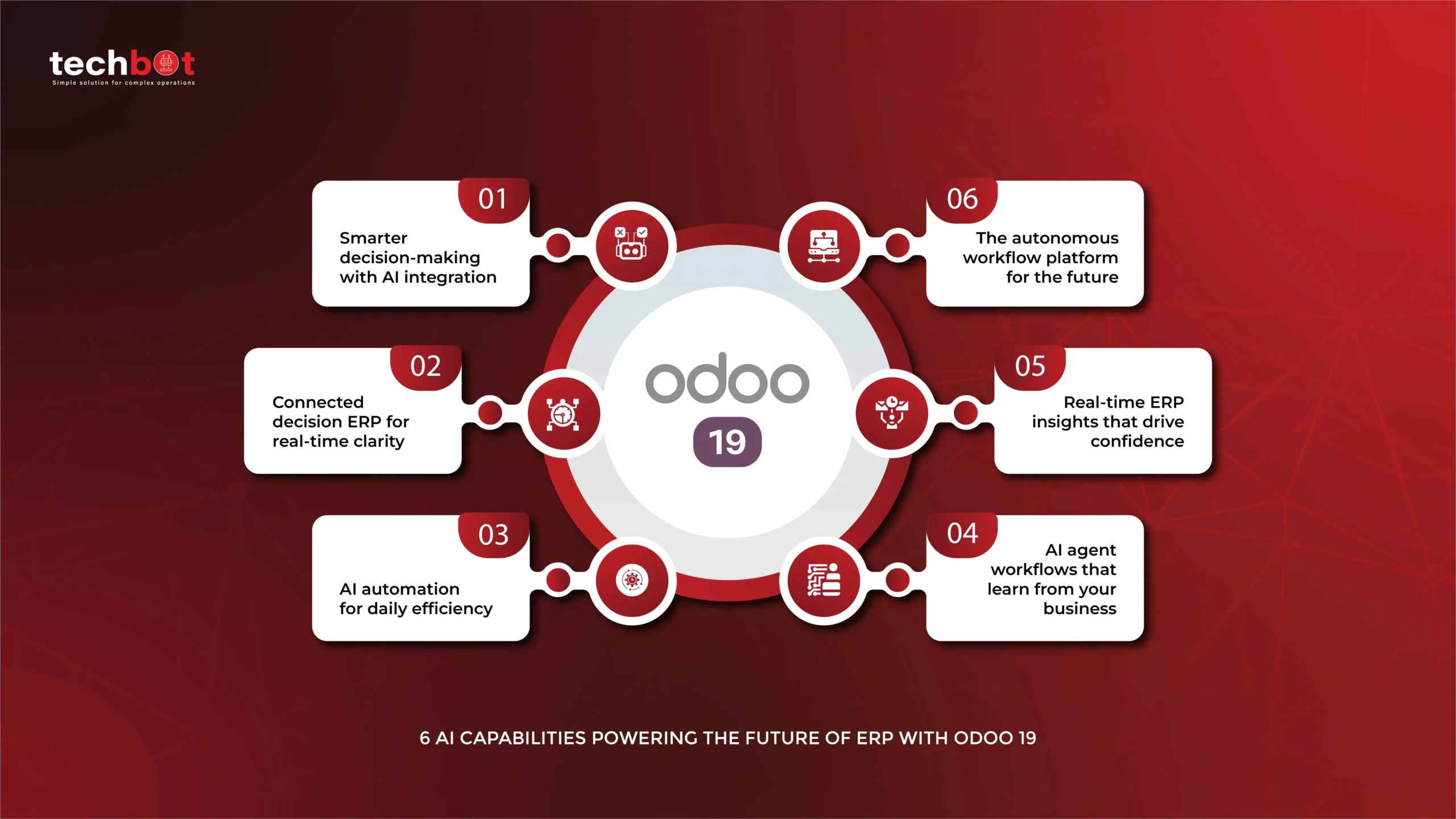
1. Smarter Decision Making with AI Integration
Odoo 19 AI integration replaces manual reporting with intelligent insights that evolve as your data grows.
The system detects business patterns, predicts outcomes, and provides contextual recommendations directly within your workflow.
Users no longer wait for end-of-month reports; they act on live information as events unfold.
This new level of AI in ERP ensures accuracy and agility in every department. Sales, finance, and operations teams collaborate on shared intelligence, creating a responsive organization that can adapt instantly to change.
2. Connected Decision ERP for Real-Time Clarity
The architecture behind Odoo 19 is designed as a connected decision ERP, meaning that every module communicates seamlessly.
When sales data updates, accounting, inventory, and HR automatically adjust their records to reflect the change.
This real-time synchronization eliminates duplicate entries and costly delays caused by outdated information.
By integrating real-time ERP insights, Odoo gives management a complete view of the business at any moment.
This transparency builds trust across departments and drives faster, evidence-based decisions that directly improve performance.
3. Odoo AI Automation for Daily Efficiency
The core of Odoo 19’s value lies in Odoo AI automation, the ability to complete routine tasks without human intervention.
Invoices, follow-up emails, and approval workflows can be handled automatically based on triggers and conditions.
Teams experience smoother handovers and fewer interruptions in their daily work.
This level of automation helps reduce human error while maintaining control and accountability.
Employees can shift their focus toward customer engagement, product development, and innovation, allowing productivity to rise naturally across the organization.
4. AI Agent Workflows That Learn from Your Business
Odoo 19 introduces AI agent workflows, intelligent assistants that learn and act based on company behavior.
These agents monitor activity, recognize patterns, and execute tasks such as invoice creation, data validation, or progress tracking.
Their adaptive nature means the more you use them, the better they understand your processes.
Through these self-learning systems, Odoo evolves into an autonomous workflow platform that supports employees like an extra team member.
It builds consistency, reduces repetitive work, and ensures critical operations run smoothly even during busy periods.
5. Real-Time ERP Insights That Drive Confidence
With Odoo 19, leaders no longer rely on static spreadsheets.
The system delivers real-time ERP insights that reflect the company’s current performance and upcoming trends.
AI-powered dashboards update continuously, enabling leaders to react instantly to opportunities or potential risks.
This visibility promotes better planning and accountability at all levels of management.
Every team benefits from having accurate, up-to-date data, ensuring that decisions are made with complete confidence.
6. The Autonomous Workflow Platform for the Future
Odoo 19 marks the beginning of a new phase in business management, the rise of the autonomous workflow platform.
Its AI agents operate responsibly, executing daily routines and optimizing processes over time.
From generating reports to handling compliance updates, tasks are completed automatically while maintaining accuracy.
This autonomy allows leaders to focus on long-term growth instead of operational firefighting.
Odoo 19 creates a self-improving environment where systems work intelligently alongside humans to achieve measurable results.
Why Businesses Choose Techbot ERP for Odoo 19 Integration
Implementing Odoo 19 AI integration requires both technical precision and a deep understanding of industry processes.
As a leading Odoo Gold Partner in the UAE, Techbot ERP ensures a structured migration strategy for every client.
Our consultants tailor each deployment around your workflows, compliance requirements, and business goals.
Beyond implementation, we help organizations leverage AI in ERP to transform data into decisions. Our approach focuses on achieving real-time ERP insights through optimized dashboards, automation, and intelligent reporting.
From migration and training to post-implementation optimization, Techbot ERP delivers measurable improvements in performance and user adoption.
We turn Odoo’s advanced AI tools into practical business value, helping your organization grow smarter with every transaction and preparing it for a future shaped by intelligent automation.
Your next ERP should support how your business thinks and grows.
Odoo 19 uses AI and smarter automation to deliver that shift from day one.

Building Smarter Businesses through Odoo 19 AI Integration
Migrating to Odoo 19 represents a clear step toward intelligent, connected business operations. This version unites automation, analytics, and adaptability through its advanced AI in the ERP framework. With Odoo AI automation, AI agent workflows, and real-time ERP insights, organizations gain a level of visibility and precision that older systems cannot match.
By transforming data into decisions, Odoo 19 functions as a true connected decision ERP, helping teams act faster and plan smarter. Its intelligent capabilities create an autonomous workflow platform where tasks are completed automatically and leadership gains instant clarity.
For UAE enterprises ready to modernize, Techbot ERP delivers the expertise needed to implement and customize Odoo 19 AI integration effectively. Together, we help you build a business environment driven by intelligence, efficiency, and long-term growth, the foundation of tomorrow’s intelligent enterprise.

Get the latest tips and updates on ERP software solutions. Subscribe to our newsletter and stay ahead in business!
Latest Post
Recent Posts
- How our ERP solution simplifies multi property management
- UAE E‑Invoicing Phases and Deadlines: What Businesses Need to Know | A Complete Guide
- Odoo Pricing Guide for the UAE 2026 | Key Factors to Consider Before Your Implementation
- Why Clean Data Drives The Highest ROI In Real Estate ERP Projects
- ERP Trends To Watch Before Stepping Into 2026: A Comprehensive Outlook
- Importance Of ERP For Growth And Compliance In Real Estate
- Why You Should Consider Odoo 19 For Your Next ERP Upgrade
- Odoo 19 Migration For Real Estate: Benefits, Risks & Migration Checklist
- How AI Agents In Odoo 19 Are Revolutionizing Business Support
- Top 7 Odoo 19 AI Features Transforming Business Workflows
What to read next
Odoo 19 Migration For Real Estate: Benefits, Risks & Migration Checklist
Odoo 19 Migration For Real Estate: Benefits, Risks & Migration Checklist
Moossa M. Alavi
Moossa M. Alavi is the Founder & CEO of Techbot ERP and Altamyz Advertising. He is a certified Odoo consultant with more than 27 years of experience in business, advertising, and ERP software. Moossa started his career in the UAE in 1997 with a well-known group in Abu Dhabi. Over the years, he built his own companies to help other businesses work better using technology. Moossa helps with customized ERP implementation for various industries, including manufacturing, insurance, supercar rental, and logistics, through Techbot ERP. He resolves these issues with Odoo ERP and supports businesses in growing with the right assets and guidance. Moossa has received many awards for his work, including the Arabian Best of Best Award and the Industry Leader Award from BNI UAE. He is also a BNI Ambassador and mentors other business owners. He believes in giving back to the community and helping others grow, following the “Givers Gain” principle.
Share this post
Latest Post
Recent Posts
- How our ERP solution simplifies multi property management
- UAE E‑Invoicing Phases and Deadlines: What Businesses Need to Know | A Complete Guide
- Odoo Pricing Guide for the UAE 2026 | Key Factors to Consider Before Your Implementation
- Why Clean Data Drives The Highest ROI In Real Estate ERP Projects
- ERP Trends To Watch Before Stepping Into 2026: A Comprehensive Outlook
- Importance Of ERP For Growth And Compliance In Real Estate
- Why You Should Consider Odoo 19 For Your Next ERP Upgrade
- Odoo 19 Migration For Real Estate: Benefits, Risks & Migration Checklist
- How AI Agents In Odoo 19 Are Revolutionizing Business Support
- Top 7 Odoo 19 AI Features Transforming Business Workflows
The UAE real estate industry continues to be one of the country’s strongest economic pillars. In the first nine months of 2024, the sector contributed about 7.6% of the nation’s GDP, reflecting its steady growth and influence on national development. This progress highlights how digital transformation and modern infrastructure are shaping the next phase of the property market.
However, despite this expansion, many developers, property managers, and real estate brokers still depend on outdated or disconnected ERP software that limits visibility and coordination. Managing listings, finance, and compliance across multiple systems creates inefficiency and slows decisions.
To overcome these challenges, forward-thinking real estate firms are turning to Odoo ERP software, an intelligent, unified solution designed to manage property operations, automate workflows, and ensure UAE-specific compliance from one platform. With implementation support from Techbot ERP, one of the region’s leading Odoo Gold Partners, businesses can migrate with confidence and clarity. For companies in the real estate industry, migrating to Odoo 19 is not just a technology upgrade; it is a strategic move to build agility, ensure business continuity, and prepare for the next phase of growth in the UAE market.
Why Odoo 19 Migration Matters for Real Estate Businesses
The success of a real estate company depends on agility and precise coordination across departments. Every property listing, client interaction, and financial transaction needs to work in harmony. Odoo 19 migration for the real estate industry addresses this complexity by combining automation, analytics, and compliance within a single connected system. For companies seeking deeper insights into modern ERP solutions, this guide on ERP for Real Estate UAE explains how Odoo ERP helps real estate firms improve efficiency, maintain compliance, and achieve better control over daily operations.
Below are some of the main reasons why forward-thinking UAE developers and real estate firms are choosing Odoo 19 ERP.
1. Integrated Data and Automation
Odoo 19 centralizes all major real estate functions such as listings, leads, contracts, commissions, and accounting. Instead of working in separate spreadsheets or outdated tools, teams can access real-time dashboards that display sales performance, occupancy rates, and financial health in a single view.
This integrated ERP software reduces human error, enhances data accuracy, and ensures every team member works with the same information. By automating repetitive tasks, employees gain more time to focus on client relationships, sales negotiations, and long-term planning. Decision-makers benefit from instant insights and complete operational visibility.
2. Real Estate-Focused Features
Unlike generic ERP systems, Odoo 19 is designed with the needs of real estate professionals in mind. It includes specialized features that cover every stage of the property management cycle.
Agents can easily prepare RERA forms, generate Trakheesi permits, and issue E-invoices to maintain full compliance with UAE regulations.
It also offers:
- Automated contract creation and renewal scheduling
- Gantt view to monitor property availability and occupancy
- Commission tracking for brokers and partners
- VAT-ready accounting for finance teams
These capabilities make migration to Odoo software a practical choice for real estate companies aiming to improve productivity, stay compliant, and close deals faster.
3. Regulatory Compliance and UAE Localization
Odoo 19 includes updated UAE localization packs that meet all major financial and legal requirements. Businesses can easily comply with FTA Article 59 by ensuring AED amounts appear clearly on invoices. The UAE fiscal localisation documents from Odoo’s official documentation show that Odoo supports the United Arab Emirates chart of accounts, VAT setup, and tax-localisation modules.
All data, such as leases, invoices, and contracts, is stored securely within the system, allowing management teams to retrieve and review reports at any time. Odoo 19 migration for the real estate industry ensures that compliance is built directly into the platform, allowing businesses to focus on growth instead of paperwork.
4. Cost Efficiency and Long-Term Agility
Odoo 19 provides a modern, open-source ERP software environment that costs significantly less than traditional systems. Businesses can start with essential modules such as sales or accounting and then add more applications like CRM, HR, or property management as operations expand.
This modular structure allows firms to grow without redesigning their entire ERP system. By eliminating old code, outdated security layers, and recurring technical issues, migration to Odoo 19 helps reduce maintenance costs while increasing scalability and performance.
- Scalability: Adapt the system as your business expands, allowing it to grow with you.
- Customization: Customize the software to meet specific needs without complex coding, ensuring it fits perfectly with your operations.
- Efficiency: Automate and streamline workflows, saving time, reducing errors, and making your business more productive.
- Real-time data: Access accurate and updated information at any time to make informed business decisions.
Choosing Odoo ERP ensures that your business has a flexible and cost-effective solution for managing every part of your operations. However, for Odoo ERP implementation to be successful, the process needs careful planning and execution. With the right partner like Techbot, your Odoo ERP implementation will set the stage for success
Make Your ERP Migration Risk-Free.
Request a custom Odoo 19 migration plan from Techbot ERP and see how fast you can modernize your operations.

Common Migration Risks and How to Overcome Them
Migrating ERP software is an important business decision that impacts every function, from sales and accounting to property management and reporting. While the benefits of Odoo 19 are clear, the migration process must be handled carefully to avoid business interruptions. Without a structured plan, even small errors in data transfer, integration, or user training can lead to project delays and reduced system adoption.
Real estate firms, in particular, manage large volumes of contracts, tenant records, and financial transactions that require precise mapping and validation during migration. Partnering with an experienced Odoo implementation team helps minimize these risks by ensuring data accuracy, compatibility with existing workflows, and continuous user support during the transition.
The table below summarizes the most common migration challenges and the best practices to overcome them effectively.

ERP Software Migration Checklist for Real Estate Firms
A structured approach helps ensure a smooth transition and minimizes risks during migration to Odoo software. Migrating an ERP system is not just a technical activity; it requires coordination between management, finance, sales, and IT teams to align goals and expectations. Each step in the process should focus on preserving data accuracy, maintaining business continuity, and ensuring that end users are fully prepared to adopt the new system.
Establishing a clear roadmap and defined responsibilities before starting the migration helps prevent confusion and shortens the implementation timeline. The checklist below outlines the key stages every real estate company should follow for a successful and secure migration to Odoo ERP.
- Audit Current ERP Systems: Review workflows, integrations, and data sources. Identify which processes need migration or redesign.
- Backup and Validate Data: Export all records and confirm that backups can be restored successfully.
- Prepare the Odoo 19 Environment: Set up a test server with UAE localization packs, a chart of accounts, and the preferred language.
- Perform Data Migration: Use migration scripts or ETL tools, starting with small data samples before executing the full migration.
- Functional and UAT Testing: Compare records such as invoices, contracts, and financial balances between old and new systems.
- Train Users and Document Processes: Update training materials and conduct live workshops for all departments.
- Go Live and Monitor: Choose a time when business activity is low, and monitor data accuracy and performance during the first week.
- Post-Migration Support: Keep a support window open with your Odoo implementation partner for fine-tuning reports and user access.
Benefits of Odoo Migration
Migrating to Odoo 19 gives real estate businesses a unified and intelligent ERP platform that connects every department, automates repetitive work, and ensures compliance with UAE regulations. It helps teams improve productivity, make faster decisions, and build a more scalable operation.
- Integrated Data and Automation
Odoo 19 centralizes all real estate functions into one platform, giving teams real-time visibility and reducing manual errors.
- Real Estate-Focused Features
The system includes RERA forms, Trakheesi permits, automated contracts, VAT-ready accounting, and other tools built for real estate workflows.
- Regulatory Compliance and UAE Localization
Odoo supports the UAE chart of accounts, VAT setup, and tax-localisation modules, ensuring built-in compliance for all financial operations.
- Cost Efficiency and Long-Term Agility
Its open-source model delivers enterprise-grade capabilities at a lower cost and allows businesses to scale without reimplementation.
- Enhanced Collaboration and Data Transparency
Odoo connects teams across departments, improving coordination, accountability, and access to real-time business data.
Building Smarter Real Estate with Odoo 19
Migrating to Odoo 19 ERP is more than a technical upgrade; it is a strategic investment in the future of your real estate business. As an Official Odoo Gold Partner in the UAE, Techbot ERP helps real estate companies manage this transformation with precision. Our consultants create structured migration plans, maintain data integrity, and configure modules to meet UAE-specific requirements such as RERA compliance, VAT, and corporate tax. Every implementation is tailored to your property management and financial workflows, ensuring accuracy and continuity from the start.
With the right roadmap, careful testing, and expert guidance, your migration can be completed on time, within budget, and with measurable efficiency gains. Odoo 19 builds a connected ecosystem where information moves freely across departments, compliance is handled automatically, and decisions are made with confidence. Partnering with Techbot ERP enables your business to move beyond outdated systems into a unified platform that connects people, properties, and performance, creating a strong foundation for sustained growth in the years ahead.

Get the latest tips and updates on ERP software solutions. Subscribe to our newsletter and stay ahead in business!
Latest Post
Recent Posts
- How our ERP solution simplifies multi property management
- UAE E‑Invoicing Phases and Deadlines: What Businesses Need to Know | A Complete Guide
- Odoo Pricing Guide for the UAE 2026 | Key Factors to Consider Before Your Implementation
- Why Clean Data Drives The Highest ROI In Real Estate ERP Projects
- ERP Trends To Watch Before Stepping Into 2026: A Comprehensive Outlook
- Importance Of ERP For Growth And Compliance In Real Estate
- Why You Should Consider Odoo 19 For Your Next ERP Upgrade
- Odoo 19 Migration For Real Estate: Benefits, Risks & Migration Checklist
- How AI Agents In Odoo 19 Are Revolutionizing Business Support
- Top 7 Odoo 19 AI Features Transforming Business Workflows
What to read next
How AI Agents In Odoo 19 Are Revolutionizing Business Support
How AI Agents In Odoo 19 Are Revolutionizing Business Support
Moossa M. Alavi
Moossa M. Alavi is the Founder & CEO of Techbot ERP and Altamyz Advertising. He is a certified Odoo consultant with more than 27 years of experience in business, advertising, and ERP software. Moossa started his career in the UAE in 1997 with a well-known group in Abu Dhabi. Over the years, he built his own companies to help other businesses work better using technology. Moossa helps with customized ERP implementation for various industries, including manufacturing, insurance, supercar rental, and logistics, through Techbot ERP. He resolves these issues with Odoo ERP and supports businesses in growing with the right assets and guidance. Moossa has received many awards for his work, including the Arabian Best of Best Award and the Industry Leader Award from BNI UAE. He is also a BNI Ambassador and mentors other business owners. He believes in giving back to the community and helping others grow, following the “Givers Gain” principle.
Share this post
Latest Post
Recent Posts
- How our ERP solution simplifies multi property management
- UAE E‑Invoicing Phases and Deadlines: What Businesses Need to Know | A Complete Guide
- Odoo Pricing Guide for the UAE 2026 | Key Factors to Consider Before Your Implementation
- Why Clean Data Drives The Highest ROI In Real Estate ERP Projects
- ERP Trends To Watch Before Stepping Into 2026: A Comprehensive Outlook
- Importance Of ERP For Growth And Compliance In Real Estate
- Why You Should Consider Odoo 19 For Your Next ERP Upgrade
- Odoo 19 Migration For Real Estate: Benefits, Risks & Migration Checklist
- How AI Agents In Odoo 19 Are Revolutionizing Business Support
- Top 7 Odoo 19 AI Features Transforming Business Workflows
Modern businesses operate in a fast-changing environment where speed, accuracy, and responsiveness decide how well a company performs. Teams often struggle to find information buried inside long documents. Managers spend hours reviewing records across multiple systems. Customers expect fast responses at any hour of the day. As operations grow, these challenges become bigger and more expensive to fix. Odoo 19 solves this problem by introducing a completely new approach to business support through AI Agents. Instead of forcing employees to navigate complex systems, the platform learns from company data and guides them through the right decisions.
AI Agents are deeply integrated into the ERP and can understand context, search internal documents, and perform actions based on natural language input. This removes the need for technical expertise to access reports or queries. AI-powered workflows improve accuracy and consistency without slowing down work. By making smart assistance part of the daily routine, Odoo 19 creates a workplace where information is easy to access, tasks are completed faster, and employees can focus on strategy instead of manual effort.
What Are AI Agents in Odoo 19
AI Agents in Odoo 19 act like intelligent assistants that live inside your ERP. They read internal documents, understand your company procedures, and respond to natural language requests. These agents work using retrieval augmented generation which means the system pulls answers from your real business data and not generic public sources. Employees can upload manuals, SOPs, knowledge articles, or PDFs to train specific agents based on department needs.
Before we review the benefits, it is important to understand how these agents behave differently depending on context. The AI notices what record is currently open and uses that information to provide more relevant answers. This level of intelligence helps employees avoid guesswork and reduces data related errors.
Key capabilities of Odoo 19 AI Agents include
• Reading internal policy manuals to answer questions instantly
• Searching live database records without custom filters
• Performing actions such as creating tasks or calendar events
• Adjusting responses based on the module currently open
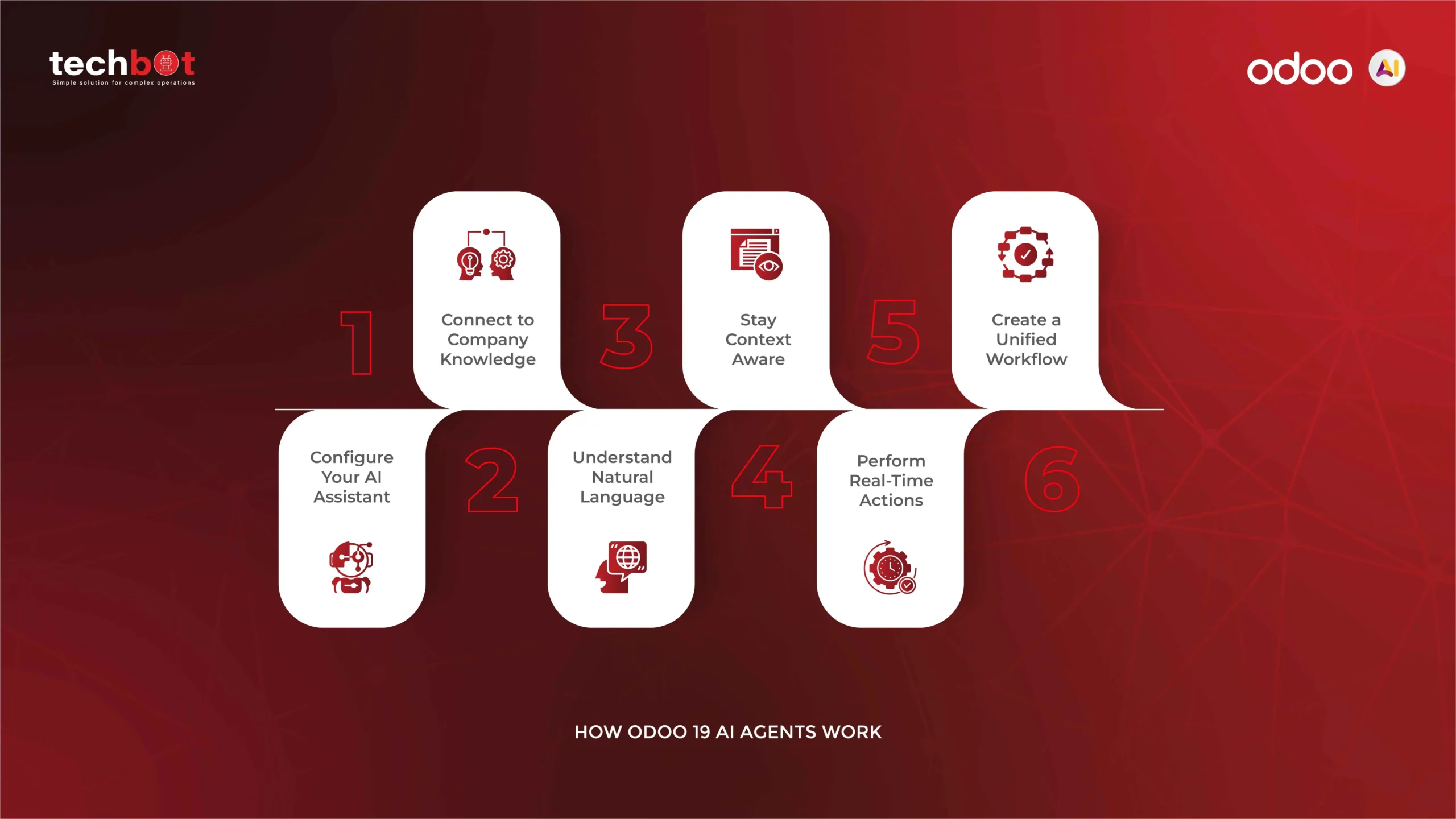
1. Configure Your AI Assistant
The first step in making AI work for your business is configuration. Odoo 19 allows companies to create and customize AI Agents inside Odoo Studio. Each agent can be trained with a specific role, purpose, and system prompt. For example, businesses can design an AI Sales Advisor, an Accounting Helper, or a Support Assistant that follows internal guidelines.
Once configured, the agent becomes available inside Odoo applications. Employees can simply ask questions or request support. Setup requires no coding, making AI adoption accessible for non technical users.
Key benefits during configuration
• Define the role and personality of the agent
• Assign access rules for safe usage
• Train the agent based on internal business needs
2. Connect to Company Knowledge
After configuration, the AI Agent connects to the company knowledge base. This step is important because the agent learns directly from internal documents rather than public sources. Businesses can upload PDFs, policy manuals, product sheets, training guidelines, or web links.
By reading and understanding these materials, the AI becomes smarter and more useful. For example, if employees need clarification on return policies or warranty instructions, the AI can answer instantly based on official company information.
Company knowledge improves functionality through
• Accurate and consistent answers
• Reduced dependency on human assistance
• Automatic referencing of important policies
Turn everyday processes into intelligent actions.
Odoo 19 AI helps teams increase productivity and operate smarter at scale.

3. Understand Natural Language
One of the most powerful features of Odoo 19 AI Agents is the ability to understand natural language. Users can type questions in simple English such as show overdue invoices or summarize last week customer emails. The AI reads the input and identifies the correct action.
This feature removes technical barriers. Employees no longer need to build filters, write queries, or search through multiple menus. The system interprets meaning and performs tasks automatically.
Natural language understanding helps with
• Faster information discovery
• Improved accessibility for all roles
• Reduced learning curve for new employees
4. Perform Real-Time Actions
AI Agents do not just return answers. They can take action inside the ERP. For example, the agent can create calendar events, update customer records, schedule follow ups, draft emails, or assign tasks. All these actions happen under existing user permissions to ensure data security.
Real time execution turns AI into a true assistant instead of a passive tool. It saves several minutes per task, which adds up significantly across the organization.
Real time actions enable
• Faster completion of repetitive tasks
• Higher productivity across departments
• Reduced manual workload for busy teams
5. Stay Context Aware
Context awareness means the AI understands what record, module, or screen the user is currently viewing. If an employee is on a customer record, the AI focuses on communication history, invoices, and activities. If the employee is on a project task, the AI references deadlines, time sheets, and team members.
Because the AI sees the same screen as the user, answers are more accurate and relevant. This removes the need for long explanations or additional confirmations.
Context awareness improves workflows by
• Providing answers linked to current records
• Reducing misunderstandings and errors
• Saving time by removing unnecessary steps
6. Create a Unified Workflow
The final step is creating a unified workflow where all departments benefit from intelligence. Sales teams can request lead summaries, support agents can answer ticket questions, marketing can generate product copy, and finance can review overdue transactions. All of this happens from a single AI layer.
This unified experience improves digital adoption. Teams no longer jump between different chatbots or tools. Everything is centralized inside Odoo, ensuring consistent behavior across the ERP.
Unified workflows support
• Seamless communication between departments
• Better customer experiences
• Faster decision making and reporting
How Odoo 19 Improves on Odoo 18
The upgrade from Odoo 18 to Odoo 19 is a leap forward. Previous versions depended on external connectors for advanced AI use. Odoo 19 brings native support without any external add on requirements. This means faster configuration and better performance.
Security is also improved since the AI respects internal access rights. If a user does not have permission to view financial dashboards, the AI will not provide those answers. This controlled behavior makes businesses comfortable adopting AI.
Major improvements compared to Odoo 18
• Native chatbot integration for websites and portals
• Improved content generation inside all modules
• Retrieval augmented knowledge with internal documents
• Automatic database querying using natural language
Security and Access Control
Security remains one of the most important concerns for business leaders. Odoo 19 ensures AI Agents follow existing user permissions. If the employee does not have access rights, the AI will not retrieve or expose that information. The platform never bypasses permission structures.
Additionally, the data used to train AI Agents remains within the business environment. This removes concern about external models storing sensitive content. By keeping everything inside Odoo, companies maintain control and compliance.
Security advantages
• AI respects existing permissions
• No unauthorized record exposure
• Controlled environment for internal documents
• Data privacy maintained for critical information
Real Examples from Odoo Experience 2025
During Odoo Experience 2025, experts demonstrated real world use cases that showed immediate value. Sales teams received guidance on cross selling based on customer history. Accounting agents flagged missing tax fields on invoices. Customer portals allowed order status queries without human involvement. Project managers asked about cost performance and received instant visual reports.
These demonstrations highlighted how AI Agents provide practical support rather than theoretical promises. Teams experienced reduced onboarding time, fewer errors, and faster communication.
Key examples from live demos
• Sales advisory tips for closing deals
• Accounting checks that detect field errors
• Customer chat portals pulling live shipment data
• Natural language data analytics creating charts instantly
Future Scope of AI in Odoo
The roadmap for AI inside Odoo includes predictive insights, proactive task reminders, and automated workflows that adapt based on performance trends. As data grows, the AI layer will learn usage patterns and highlight anomalies before they become major issues. Predictive planning will help with demand forecasting, inventory decisions, and project budgeting.
This future direction confirms that businesses investing in Odoo 19 today will benefit even more in the coming years. The platform is designed to evolve continuously, supporting long term modernization strategies.
Possible future improvements
• Predictive maintenance for machinery and assets
• Automated purchasing recommendations
• Budget forecasting based on seasonal usage trends
• Intelligent approval routing based on risk levels
Risk of Not Adopting AI
Companies that ignore AI risk falling behind competitors who automate manual work. Without intelligent assistance, employees spend more time searching for information, responding to basic questions, and preparing documentation. Customers experience slower support responses. Managers struggle to access insights quickly during daily decisions.
These challenges directly impact revenue growth, customer retention, and profit margins. While AI does not replace humans, it increases capacity and improves consistency without adding new staff.
Consequences of delaying AI adoption
• Higher support and labor costs
• Slower response times for internal tasks
• Poor visibility into data based decisions
• Customer dissatisfaction due to delayed responses
The Future of Intelligent Business Support Starts Here
Artificial intelligence is changing the way work happens inside companies. Instead of relying on manual processes, employees can now ask questions, create documents, and perform actions through natural language support. Odoo 19 AI Agents make this possible by connecting internal knowledge, understanding context, and executing real time tasks. Over time, this leads to faster responses, fewer mistakes, and smoother collaboration across teams.
Businesses that adopt AI early will benefit from improved customer satisfaction, reduced operational costs, and stronger forecasting capabilities. AI Agents help organizations automate routine work while letting employees focus on important decisions. As these capabilities expand, AI becomes a strategic advantage rather than a simple tool.
For companies in the UAE looking to modernize operations, this is the perfect moment to start. As an official Odoo Gold Partner in the UAE, Techbot ERP helps organizations implement, configure, and customize Odoo 19 with AI-powered workflows tailored to their needs. With expert guidance, smart integration, and ongoing support, Techbot helps businesses maximize the full potential of intelligent ERP systems.

Get the latest tips and updates on ERP software solutions. Subscribe to our newsletter and stay ahead in business!
Latest Post
Recent Posts
- How our ERP solution simplifies multi property management
- UAE E‑Invoicing Phases and Deadlines: What Businesses Need to Know | A Complete Guide
- Odoo Pricing Guide for the UAE 2026 | Key Factors to Consider Before Your Implementation
- Why Clean Data Drives The Highest ROI In Real Estate ERP Projects
- ERP Trends To Watch Before Stepping Into 2026: A Comprehensive Outlook
- Importance Of ERP For Growth And Compliance In Real Estate
- Why You Should Consider Odoo 19 For Your Next ERP Upgrade
- Odoo 19 Migration For Real Estate: Benefits, Risks & Migration Checklist
- How AI Agents In Odoo 19 Are Revolutionizing Business Support
- Top 7 Odoo 19 AI Features Transforming Business Workflows
What to read next
Top 7 Odoo 19 AI Features Transforming Business Workflows
Top 7 Odoo 19 AI Features Transforming Business Workflows
Moossa M. Alavi
Moossa M. Alavi is the Founder & CEO of Techbot ERP and Altamyz Advertising. He is a certified Odoo consultant with more than 27 years of experience in business, advertising, and ERP software. Moossa started his career in the UAE in 1997 with a well-known group in Abu Dhabi. Over the years, he built his own companies to help other businesses work better using technology. Moossa helps with customized ERP implementation for various industries, including manufacturing, insurance, supercar rental, and logistics, through Techbot ERP. He resolves these issues with Odoo ERP and supports businesses in growing with the right assets and guidance. Moossa has received many awards for his work, including the Arabian Best of Best Award and the Industry Leader Award from BNI UAE. He is also a BNI Ambassador and mentors other business owners. He believes in giving back to the community and helping others grow, following the “Givers Gain” principle.
Share this post
Latest Post
Recent Posts
- How our ERP solution simplifies multi property management
- UAE E‑Invoicing Phases and Deadlines: What Businesses Need to Know | A Complete Guide
- Odoo Pricing Guide for the UAE 2026 | Key Factors to Consider Before Your Implementation
- Why Clean Data Drives The Highest ROI In Real Estate ERP Projects
- ERP Trends To Watch Before Stepping Into 2026: A Comprehensive Outlook
- Importance Of ERP For Growth And Compliance In Real Estate
- Why You Should Consider Odoo 19 For Your Next ERP Upgrade
- Odoo 19 Migration For Real Estate: Benefits, Risks & Migration Checklist
- How AI Agents In Odoo 19 Are Revolutionizing Business Support
- Top 7 Odoo 19 AI Features Transforming Business Workflows
Odoo 19 represents a major leap in enterprise automation by seamlessly integrating artificial intelligence into every workflow. At Odoo Experience 2025, the spotlight was on how AI is no longer an add-on but a built-in core of Odoo’s new ecosystem. Businesses can now rely on smart features that predict, assist, and automate tasks across every department.
The new release makes Odoo feel more like a digital teammate than a traditional ERP. It understands your commands, learns from your actions, and takes decisions that save time and reduce human error. With intelligent AI agents, voice recognition, and natural language search, Odoo 19 has set a new benchmark for modern business management.
In this article, Techbot ERP, the Official Odoo Gold Partner in the UAE, explores the seven most powerful AI features in Odoo 19 that are helping organizations operate faster, smarter, and more efficiently.
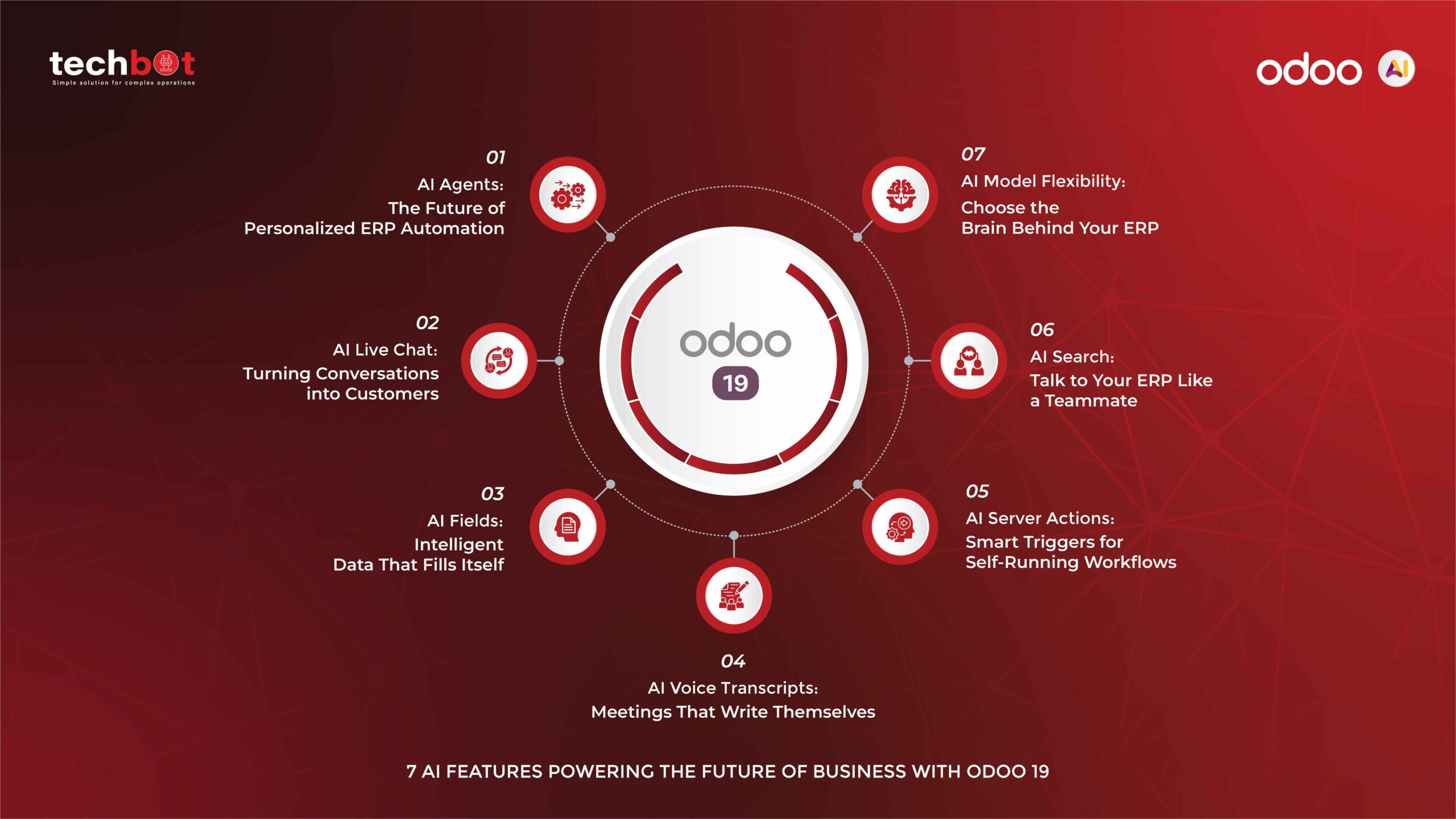
1. AI Agents: Personalized Automation for Every Role
Odoo 19 introduces AI Agents that act as smart virtual assistants tailored to different business roles. These agents can perform actions, access company data, and respond to user commands with contextual intelligence. Powered by top-tier AI models such as OpenAI GPT and Google Gemini, these agents become an integral part of everyday operations.
Each AI Agent can be configured to handle specific responsibilities such as HR support, compliance checks, or CRM updates. They analyze documents, pull insights from knowledge bases, and execute real-time tasks like creating events or updating invoices. This allows every team member to work faster with fewer errors and less manual input.
Businesses can deploy multiple agents for various departments, each capable of understanding instructions in plain language. By delegating routine activities to these smart assistants, teams can focus more on strategic goals and customer satisfaction. The result is higher productivity, smoother collaboration, and more consistent outcomes across the company.`
Meet the AI-ready ERP for tomorrow’s enterprises.
Odoo 19 turns complex tasks into automated flows, making your business sharper and faster.

2. AI Live Chat: 24/7 Website Support and Smart Lead Capture
With the new AI Live Chat, Odoo 19 makes customer engagement effortless and continuous. Businesses can now greet website visitors through AI-driven chatbots that provide instant responses around the clock. These intelligent chat agents can answer product-related questions, offer guidance, and qualify leads in real time.
The AI automatically detects intent in customer conversations, identifying when a visitor shows purchase interest or requests a demo. It then creates a lead record in the CRM instantly, ensuring no opportunity is missed. This feature transforms your website into a fully automated lead-generation engine that nurtures prospects before a human salesperson steps in.
It enhances brand responsiveness and customer satisfaction by reducing wait times and improving the overall digital experience. Whether your company handles ten visitors or ten thousand, the AI Live Chat manages every inquiry efficiently, capturing valuable data and streamlining your sales process.
3. AI Fields: Smarter Data Entry and Bulk Updates
Odoo 19 eliminates tedious data entry through intelligent AI-assisted fields that auto-fill and predict values. The system examines your past inputs and available datasets to suggest or complete fields automatically. This not only saves time but also ensures data accuracy across records.
For example, when creating a new contact, the AI might automatically fill in the address or company details based on existing information. Users can also issue simple text commands such as “apply a five percent discount to all active clients” or “update all invoices for this quarter” to make bulk changes instantly.
By interpreting natural language instructions, AI Fields reduce manual workload and simplify record management. This makes Odoo 19 an intuitive ERP for all users, regardless of their technical background. It strengthens data integrity while freeing up valuable time for more meaningful business tasks.
4. AI Voice Transcripts: Meeting Notes and Voice Commands
The new AI Voice Transcript feature turns speech into actionable data within Odoo 19. It can record meetings, transcribe conversations, and summarize the discussion automatically, saving teams from manual note-taking. The transcription is highly accurate, and summaries are ready to share immediately after the meeting.
Beyond meetings, users can dictate memos, update records, or issue commands through voice input. For instance, a sales executive can record client details verbally, and the AI will automatically save the information in the CRM. This voice-driven functionality enhances convenience for professionals working on the move.
It bridges the gap between physical discussions and digital records, ensuring that no critical information is ever lost. With this feature, Odoo becomes a hands-free business companion that captures, organizes, and interprets spoken information effortlessly.
5. AI Server Actions: Intelligent Triggers and Smart Record Creation
Odoo 19 empowers backend automation with AI-enhanced Server Actions that can understand context and execute smart responses. The system can analyze triggers such as new emails or uploaded files and automatically perform relevant actions. This adds intelligence to what used to be routine automation.
A vendor invoice uploaded in PDF format can now generate a complete accounting entry without any manual data entry. Similarly, AI can extract details from resumes, business cards, or customer forms and create new records instantly. These capabilities minimize human effort while maintaining exceptional data precision.
This advanced automation lets businesses run their operations continuously without delays. As a result, tasks that once required hours of supervision are now handled instantly and accurately, allowing employees to focus on problem-solving and innovation.
6 . AI Search: Natural Language and Voice-Based Queries
Searching within an ERP system has never been easier. Odoo 19’s AI-powered search feature understands natural language, allowing users to type or speak questions just like they would in a search engine. The AI translates the query into filters and instantly displays accurate results.
You can ask questions such as “show pending invoices for September” or “find customers in Dubai with sales above ten thousand” and receive the exact data in seconds. The search also supports voice input, enabling users to retrieve information hands-free, which is perfect for mobile or multitasking environments.
This feature democratizes data access across the organization by removing the need for technical queries. It ensures that every employee can find what they need quickly, promoting faster decision-making and greater transparency throughout the company.
7. AI Model Flexibility: ChatGPT 5, Gemini, or Custom Engines
Odoo 19 gives businesses full freedom to choose the AI model that best suits their needs. It supports multiple engines such as ChatGPT 5, Google Gemini, and custom AI models developed by the organization. This flexibility ensures companies can balance performance, privacy, and cost without compromise.
You can integrate one or several models within the same ERP environment and switch between them as technology evolves. This future-ready architecture means your system stays compatible with the latest AI advancements without any redevelopment.
Having multiple AI providers allows businesses to build intelligent workflows that match their specific industry and compliance requirements. This open ecosystem reinforces Odoo 19’s position as one of the most adaptable and intelligent ERP platforms in the world.
Techbot ERP Leads the AI Revolution with Odoo 19
Odoo 19 is more than an upgrade; it is a complete transformation of how businesses operate through AI-driven automation. Every module, from HR to finance, is now powered by intelligence that learns, predicts, and executes with precision. The result is faster decision-making, fewer errors, and more productive teams.
By adopting Odoo 19, companies gain a digital partner that understands their workflows and helps them work smarter every day. It reduces repetitive work, enhances data reliability, and delivers real-time insights that drive growth.
As the Official Odoo Gold Partner in the UAE, Techbot ERP helps businesses implement these AI-powered features seamlessly. From customization to support, Techbot ERP ensures your organization harnesses the full potential of Odoo 19 to achieve efficiency and innovation in every process.
Frequently Asked Question
What can Odoo 19’s AI Agents do for my business?
AI Agents can perform actions like creating meetings, updating records, drafting communications, and answering employee queries using your company’s internal data. They act as virtual assistants that streamline daily operations without human intervention.
Which AI models are compatible with Odoo 19?
Odoo 19 supports multiple AI engines including ChatGPT 5, Google Gemini, and custom-built models. This gives companies flexibility to choose the best option depending on performance, data security, and industry requirements
Do I need technical skills to use Odoo 19’s AI features?
No technical background is required. Odoo 19’s AI tools are built for everyday users and operate through simple commands, natural language inputs, and intuitive interfaces. Anyone can benefit from AI automation right from day one.
Can Odoo 19’s AI improve customer experience?
Yes, Odoo 19 enhances customer interactions through AI-powered live chat and automated communication tools. It provides instant responses, captures leads, and delivers personalized experiences that strengthen customer relationships.
How does Techbot ERP help businesses implement Odoo 19’s AI features?
Techbot ERP offers expert consultation, customization, and implementation support for businesses adopting Odoo 19. As the Official Odoo Gold Partner in the UAE, the team ensures that every AI feature is tailored to your workflows for maximum efficiency and value.

Get the latest tips and updates on ERP software solutions. Subscribe to our newsletter and stay ahead in business!
Latest Post
Recent Posts
- How our ERP solution simplifies multi property management
- UAE E‑Invoicing Phases and Deadlines: What Businesses Need to Know | A Complete Guide
- Odoo Pricing Guide for the UAE 2026 | Key Factors to Consider Before Your Implementation
- Why Clean Data Drives The Highest ROI In Real Estate ERP Projects
- ERP Trends To Watch Before Stepping Into 2026: A Comprehensive Outlook
- Importance Of ERP For Growth And Compliance In Real Estate
- Why You Should Consider Odoo 19 For Your Next ERP Upgrade
- Odoo 19 Migration For Real Estate: Benefits, Risks & Migration Checklist
- How AI Agents In Odoo 19 Are Revolutionizing Business Support
- Top 7 Odoo 19 AI Features Transforming Business Workflows
What to read next
How to Use Odoo 19 to Automate Real Estate Sales And Finance
How To Use Odoo 19 To Automate Real Estate Sales And Finance
Moossa M. Alavi
Moossa M. Alavi is the Founder & CEO of Techbot ERP and Altamyz Advertising. He is a certified Odoo consultant with more than 27 years of experience in business, advertising, and ERP software. Moossa started his career in the UAE in 1997 with a well-known group in Abu Dhabi. Over the years, he built his own companies to help other businesses work better using technology. Moossa helps with customized ERP implementation for various industries, including manufacturing, insurance, supercar rental, and logistics, through Techbot ERP. He resolves these issues with Odoo ERP and supports businesses in growing with the right assets and guidance. Moossa has received many awards for his work, including the Arabian Best of Best Award and the Industry Leader Award from BNI UAE. He is also a BNI Ambassador and mentors other business owners. He believes in giving back to the community and helping others grow, following the “Givers Gain” principle.
Share this post
Latest Post
Recent Posts
- How our ERP solution simplifies multi property management
- UAE E‑Invoicing Phases and Deadlines: What Businesses Need to Know | A Complete Guide
- Odoo Pricing Guide for the UAE 2026 | Key Factors to Consider Before Your Implementation
- Why Clean Data Drives The Highest ROI In Real Estate ERP Projects
- ERP Trends To Watch Before Stepping Into 2026: A Comprehensive Outlook
- Importance Of ERP For Growth And Compliance In Real Estate
- Why You Should Consider Odoo 19 For Your Next ERP Upgrade
- Odoo 19 Migration For Real Estate: Benefits, Risks & Migration Checklist
- How AI Agents In Odoo 19 Are Revolutionizing Business Support
- Top 7 Odoo 19 AI Features Transforming Business Workflows
Managing property sales, lease renewals, and financial operations across several developments can quickly become complicated even for the most experienced real estate professionals. When teams rely on spreadsheets, disconnected CRMs, and manual billing, decision-making slows down and valuable time is lost.
Odoo 19 brings a smarter way to manage it all. Its artificial intelligence powered workflows simplify routine tasks, ensure accurate reporting, and offer clear real-time visibility into sales and finance. The result is a unified system that connects every part of the real estate process in one platform.
During the Odoo Experience 2025 event in Brussels, Techbot ERP, a leading Odoo Gold Partner in the UAE, explored how Odoo 19 is changing the way property developers operate. This guide explains how you can configure, automate, and track every stage of your real estate sales and finance with Odoo 19, ensuring each transaction flows smoothly from the first inquiry to final accounting.
Preparing Your Odoo 19 Environment for Real Estate Automation
Before automation begins, setting up the right environment is essential. This step ensures your data flows seamlessly across departments and your workflows perform without friction. A structured configuration helps reduce duplication, improve visibility, and maintain accuracy across every module.
Odoo 19 integrates CRM, Sales, Accounting, and Property Management into one platform. When connected correctly, these modules create a single source of truth where every update reflects across the system in real time.
Activate core modules
Activate the core apps — Sales, CRM, Accounting, and Property or Rental Management. These modules form the backbone of automation. When enabled together, they share a unified data model, allowing leads, quotations, and invoices to stay connected.
This synchronization ensures that your property listings, deals, and financial transactions always match, helping your teams work faster and with fewer errors.
Build property hierarchies
Organize your properties in a logical hierarchy. Structure them as project, building, and unit, and assign relevant attributes like square footage, rent, and occupancy status. This clarity helps you track unit performance and manage multiple projects effortlessly.
When property data is well-structured, you can filter results, create reports, and monitor occupancy in real time without depending on external files.
Design contract and lease templates
Standardized templates ensure consistency across all your deals. Define default terms, payment schedules, and renewal conditions in Odoo 19’s contract engine. Once created, these templates can be reused for multiple projects, saving setup time.
They also guarantee compliance with UAE’s RERA requirements and make contract handling more secure and efficient for both your team and clients.
Step into the future of business automation with Odoo 19 AI.
Simplify operations, boost productivity, and make every process intelligent.

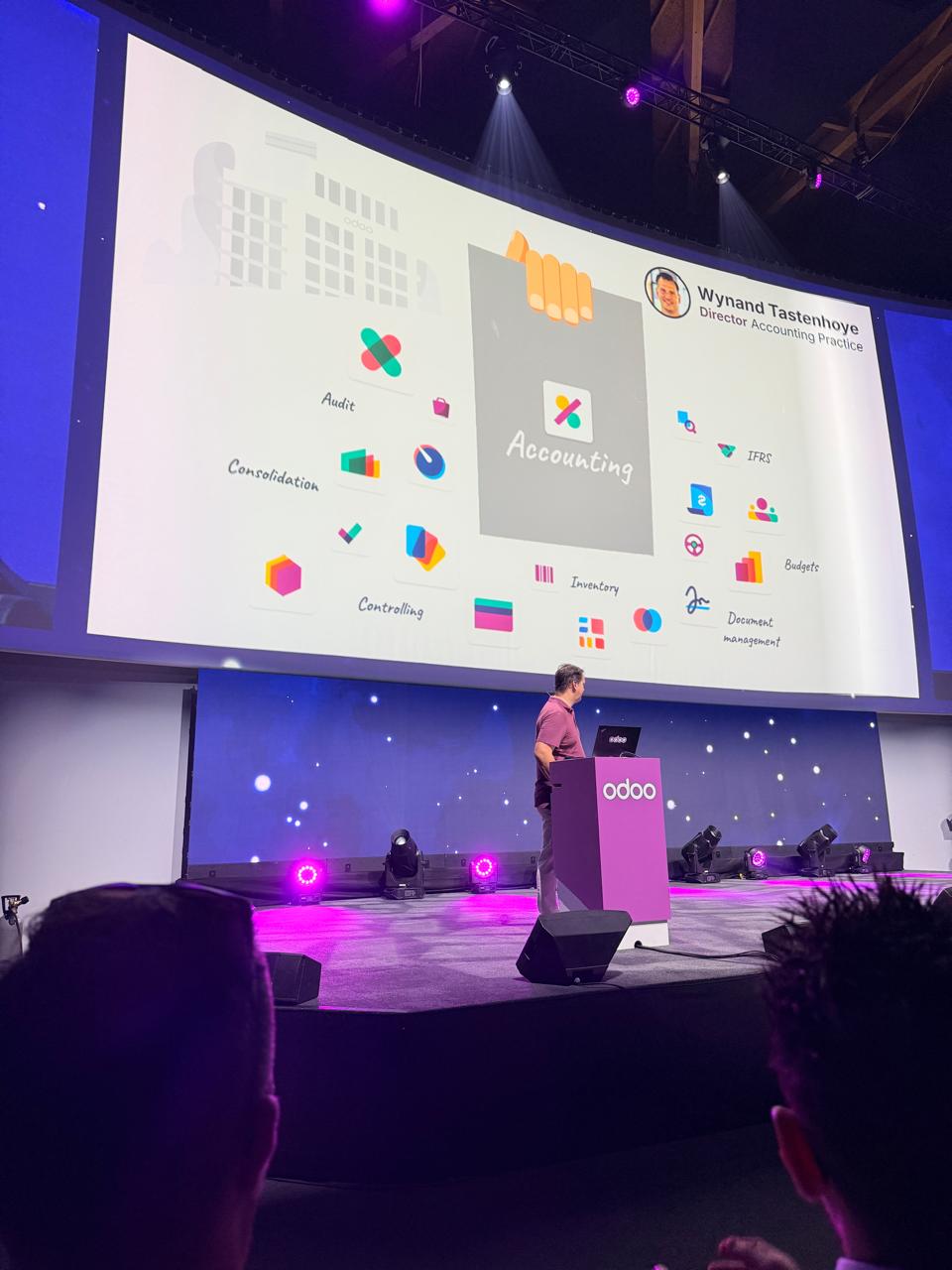
How Odoo 19 Automates Real Estate Sales Processes
Convert leads into quotations
Generate contracts automatically
Schedule follow-ups and payment reminders
Connecting Sales and Finance for Smarter Accounting
Odoo 19 makes it simple to synchronize sales and accounting. Instead of manually entering financial data, every confirmed sale or lease automatically updates the corresponding invoice and ledger. This connection reduces errors and strengthens transparency between departments.
With automation, financial teams can close monthly reports faster and access detailed profitability insights for each project in real time.
Recurring invoice generation
Set up recurring invoices that follow your contract terms. Odoo 19 can create invoices monthly, quarterly, or annually based on the configuration. It also handles VAT and RERA compliance automatically, saving significant time for finance teams.
Recurring invoicing ensures predictable cash flow and reduces the possibility of missed billing cycles.
Payment matching and reconciliation
Odoo 19 uses AI to simplify payment reconciliation. When customers make payments through bank transfers or gateways, the system matches them to open invoices automatically. This smart matching process minimizes manual checks and improves financial accuracy.
With fewer discrepancies, your finance team can focus on analysis instead of correction.
Live financial dashboards
Dashboards in Odoo 19 show real-time updates of cash flow, receivables, and profitability. They help department heads make informed decisions instantly without waiting for reports.
Each dashboard is fully customizable, allowing you to focus on key metrics that matter most to your business performance.
Leveraging AI and Automation in Real Estate Operations
Smart document recognition
Natural language insights
Cross-Module event triggers
Monitoring, Optimization, and Expansion
KPI Dashboards
Audit and Refine Automation Rules
Extend to Maintenance and Communication
Why Implement Odoo 19 with Techbot ERP
Choosing an experienced partner maximizes your ROI. Techbot ERP, a leading Odoo Gold Partner in the UAE, specializes in building localized ERP systems for developers, property managers, and construction firms.
Their certified engineers customize Odoo 19 for real estate automation with:
- Automated RERA & VAT compliance flows.
- Arabic-English bilingual interfaces.
- KPI dashboards aligned to UAE reporting standards.
- Post-launch optimization and training.
Techbot’s expertise ensures you get measurable results not just software deployment, but a scalable ERP foundation that supports your long-term digital transformation goals.
Accelerate Growth with Odoo 19 and Techbot ERP
Odoo 19 introduces intelligent automation that empowers real estate businesses to streamline operations, enhance decision-making, and unify sales, leasing, and finance in one smart platform. With AI-driven workflows and real-time data visibility, it simplifies even the most complex processes.
As a trusted Odoo Gold Partner in the UAE, Techbot ERP brings local expertise and firsthand insight from the Odoo Experience 2025 event. Their customized implementations ensure your systems are configured for accuracy, compliance, and scalable growth.
With CRM, Sales, Accounting, and Property Management working together seamlessly, you gain a real-time, end-to-end view of your business. Let Techbot ERP help you move faster, automate smarter, and grow with confidence using the full power of Odoo 19.

Get the latest tips and updates on ERP software solutions. Subscribe to our newsletter and stay ahead in business!
Latest Post
Recent Posts
- How our ERP solution simplifies multi property management
- UAE E‑Invoicing Phases and Deadlines: What Businesses Need to Know | A Complete Guide
- Odoo Pricing Guide for the UAE 2026 | Key Factors to Consider Before Your Implementation
- Why Clean Data Drives The Highest ROI In Real Estate ERP Projects
- ERP Trends To Watch Before Stepping Into 2026: A Comprehensive Outlook
- Importance Of ERP For Growth And Compliance In Real Estate
- Why You Should Consider Odoo 19 For Your Next ERP Upgrade
- Odoo 19 Migration For Real Estate: Benefits, Risks & Migration Checklist
- How AI Agents In Odoo 19 Are Revolutionizing Business Support
- Top 7 Odoo 19 AI Features Transforming Business Workflows

